Aga Khan's Global Centre for Pluralism
DO YOU KNOW A PLURALISM CHAMPION?
The nomination process for the 2019 Global Pluralism Award has launched!
Nominate or Apply
The Global Pluralism Award recognizes and supports the extraordinary achievements of organizations, individuals and governments who are tackling the challenge of living peacefully and productively with diversity.
The Award comes with financial support of $150,000 shared equally among three recipients, as well as global visibility and recognition.
Submit a nomination or apply directly at
award.pluralism.ca
The nomination process closes on April 30th 2018
The nomination process for the 2019 Global Pluralism Award has launched!
Nominate or Apply
The Global Pluralism Award recognizes and supports the extraordinary achievements of organizations, individuals and governments who are tackling the challenge of living peacefully and productively with diversity.
The Award comes with financial support of $150,000 shared equally among three recipients, as well as global visibility and recognition.
Submit a nomination or apply directly at
award.pluralism.ca
The nomination process closes on April 30th 2018
Victoria Forum Report Launch | Ideas for a Better World
Join us for the launch of the Victoria Forum Report
The University of Victoria and Global Affairs Canada joined forces last fall to explore ways to strengthen and advance diversity and inclusion in the 21st century. The inaugural Victoria Forum brought together leaders and activists from a range of fields to stimulate new thinking and approaches for how Canadians can better promote diversity and inclusion at home and abroad.
On March 21st, the Global Centre for Pluralism is pleased to celebrate the release of the Victoria Forum Report, and invites you to attend a presentation and discussion of calls for action by policy makers, academics, business and indigenous leaders, and civil society.
The Victoria Forum report will be presented by Dr. Saul Klein, Dean of the UVic Gustavson School of Business and Chair of the Victoria Forum, and Mr. Sébastien Beaulieu, Canada’s Executive Coordinator for Syria - Beirut and Forum Associate Co-chair.
March 21, 2018
12:00 - 1:30 p.m.
Light lunch will be served.
Global Centre for Pluralism
330 Sussex Drive
Ottawa
RSVP by March 19 to [email protected]
Founded by His Highness the Aga Khan in partnership with the Government of Canada, the Global Centre for Pluralism is an independent, charitable organization
that advances respect for diversity and the benefits of inclusion around the world.
Joignez-vous à nous pour le lancement du rapport du Forum de Victoria
L'automne dernier, L'Université de Victoria et Affaires mondiales Canada ont uni leurs efforts pour faire progresser la conversation sur la diversité et l'inclusion au 21e siècle. Le Forum inaugural de Victoria a rassemblé des dirigeants des Premières nations, la société civile, du secteur privé et des différents niveaux de gouvernements afin de développer de nouvelles idées et solutions pour promouvoir la diversité et l'inclusion au Canada et à travers le monde.
Le 21 mars 2018, le Centre mondial du pluralisme est heureux de célébrer la publication du rapport du Forum de Victoria et vous invite à assister à une présentation et une discussion des recommandations du Forum.
Le rapport final du Forum de Victoria sera présenté par le Dr Saul Klein, doyen de l'UVic Gustavson School of Business et Président du Forum de Victoria, et M. Sébastien Beaulieu, Coordonnateur exécutif du Canada pour la Syrie - Beyrouth et Coprésident associé du Forum.
21 mars 2018
12h à 13h30
Déjeuner léger sera servi.
Centre mondial du pluralisme
330, promenade Sussex, Ottawa
RSVP avant le 19 mars à [email protected]
Join us for the launch of the Victoria Forum Report
The University of Victoria and Global Affairs Canada joined forces last fall to explore ways to strengthen and advance diversity and inclusion in the 21st century. The inaugural Victoria Forum brought together leaders and activists from a range of fields to stimulate new thinking and approaches for how Canadians can better promote diversity and inclusion at home and abroad.
On March 21st, the Global Centre for Pluralism is pleased to celebrate the release of the Victoria Forum Report, and invites you to attend a presentation and discussion of calls for action by policy makers, academics, business and indigenous leaders, and civil society.
The Victoria Forum report will be presented by Dr. Saul Klein, Dean of the UVic Gustavson School of Business and Chair of the Victoria Forum, and Mr. Sébastien Beaulieu, Canada’s Executive Coordinator for Syria - Beirut and Forum Associate Co-chair.
March 21, 2018
12:00 - 1:30 p.m.
Light lunch will be served.
Global Centre for Pluralism
330 Sussex Drive
Ottawa
RSVP by March 19 to [email protected]
Founded by His Highness the Aga Khan in partnership with the Government of Canada, the Global Centre for Pluralism is an independent, charitable organization
that advances respect for diversity and the benefits of inclusion around the world.
Joignez-vous à nous pour le lancement du rapport du Forum de Victoria
L'automne dernier, L'Université de Victoria et Affaires mondiales Canada ont uni leurs efforts pour faire progresser la conversation sur la diversité et l'inclusion au 21e siècle. Le Forum inaugural de Victoria a rassemblé des dirigeants des Premières nations, la société civile, du secteur privé et des différents niveaux de gouvernements afin de développer de nouvelles idées et solutions pour promouvoir la diversité et l'inclusion au Canada et à travers le monde.
Le 21 mars 2018, le Centre mondial du pluralisme est heureux de célébrer la publication du rapport du Forum de Victoria et vous invite à assister à une présentation et une discussion des recommandations du Forum.
Le rapport final du Forum de Victoria sera présenté par le Dr Saul Klein, doyen de l'UVic Gustavson School of Business et Président du Forum de Victoria, et M. Sébastien Beaulieu, Coordonnateur exécutif du Canada pour la Syrie - Beyrouth et Coprésident associé du Forum.
21 mars 2018
12h à 13h30
Déjeuner léger sera servi.
Centre mondial du pluralisme
330, promenade Sussex, Ottawa
RSVP avant le 19 mars à [email protected]
Addressing Rising Nationalism in Europe:
Views from Germany’s Green Party
Featuring:
Jürgen Trittin
former German Federal Minister for the Environment
Moderated by:
Heather Scoffield
Ottawa Bureau Chief, Canadian Press
Far-right nationalism has emerged as a major force to contend with in European politics and debate. Political parties have found success by appealing to entrenched fears over increased migration and religious difference. The result has been a political climate that is being shaped by a suspicion of migrants and refugees, and even xenophobia.
Far-right nationalism poses a serious threat to pluralism by denying the myriad benefits of ethnic, cultural and religious diversity and seeking to reshape societies as homogenous and rooted in so-called “traditional” values. By valuing some groups over others, progress and potential are impeded.
Join leading member of Germany’s Green Party, federal Member of Parliament Jürgen Trittin in conversation with Heather Scoffield, Ottawa Bureau Chief at the Canadian Press for breakfast at the Global Centre for Pluralism to explore how to address the challenges of rising nationalism and xenophobia across Europe.
Tuesday, April 10, 2018
Global Centre for Pluralism
330 Sussex Drive, Ottawa
Registration and Breakfast at 7:45 AM
Discussion: 8:00 to 9:00 AM
Please register by April 6th
Click here to register
https://www.eventbrite.ca/e/addressing- ... 4551874857
Founded by His Highness the Aga Khan in partnership with the Government of Canada, the Global Centre for Pluralism is an independent, charitable organization
that advances respect for diversity and the benefits of inclusion around the world.
Views from Germany’s Green Party
Featuring:
Jürgen Trittin
former German Federal Minister for the Environment
Moderated by:
Heather Scoffield
Ottawa Bureau Chief, Canadian Press
Far-right nationalism has emerged as a major force to contend with in European politics and debate. Political parties have found success by appealing to entrenched fears over increased migration and religious difference. The result has been a political climate that is being shaped by a suspicion of migrants and refugees, and even xenophobia.
Far-right nationalism poses a serious threat to pluralism by denying the myriad benefits of ethnic, cultural and religious diversity and seeking to reshape societies as homogenous and rooted in so-called “traditional” values. By valuing some groups over others, progress and potential are impeded.
Join leading member of Germany’s Green Party, federal Member of Parliament Jürgen Trittin in conversation with Heather Scoffield, Ottawa Bureau Chief at the Canadian Press for breakfast at the Global Centre for Pluralism to explore how to address the challenges of rising nationalism and xenophobia across Europe.
Tuesday, April 10, 2018
Global Centre for Pluralism
330 Sussex Drive, Ottawa
Registration and Breakfast at 7:45 AM
Discussion: 8:00 to 9:00 AM
Please register by April 6th
Click here to register
https://www.eventbrite.ca/e/addressing- ... 4551874857
Founded by His Highness the Aga Khan in partnership with the Government of Canada, the Global Centre for Pluralism is an independent, charitable organization
that advances respect for diversity and the benefits of inclusion around the world.
Latest News from the Centre
Global Pluralism Award
Nominate Online
https://award.pluralism.ca/nominate-online/
*******
Addressing Rising Nationalism in Europe:
Views from Germany’s Green Party
http://www.pluralism.ca/event/addressin ... een-party/
******
French Republicanism and Pluralism: Can They Co-Exist?
In France, growing diversity has triggered intense debates over national identity. Focused mainly on the integration of Muslim populations, debates abound over secularism and undifferentiated citizenship in relation to historic conceptions of the French state.
The French case by John Bowen asks, how flexible is the French republican tradition? Is “pluralist republicanism" possible?
Summary:
http://www.pluralism.ca/press-release/f ... -co-exist/
******
Bridging Ethnic Divides and Building Peace:
Lessons from Kenya’s Experience
In February, the 2017 Global Pluralism Award winner Alice Nderitu launched her latest book at the Centre, Kenya, Bridging Ethnic Divides: A Commissioner’s Experience on Cohesion and Integration, about her efforts to build peace and cohesion between different ethnic and racial communities in Kenya after the violent crisis of 2007-2008. This event was presented in partnership with Simon Fraser University Morris J. Wosk Centre for Dialogue.
Watch Highlights Video here:
https://www.youtube.com/watch?v=q17v5AaucR8&t=15s
*******
Canada@150: Promoting Diversity and Inclusion Report Launch
In March, the Centre hosted the launch of the Canada@150: Promoting Diversity and Inclusion Victoria Forum Report in partnership with the University of Victoria and Global Affairs Canada. The inaugural Victoria Forum in 2017 brought together business leaders, policymakers, academics, civil society and Indigenous communities to discuss diversity, inclusion and sustainable prosperity. The report presents key findings from the Forum and reveals there is a role for everyone — people, government, businesses, philanthropists and Indigenous peoples — in building a more pluralistic society in Canada.
Read the report and view slides here
http://www.pluralism.ca/event/victoriaforumreport/
******
Have you seen the Centre’s new look?
The Centre has launched a new website.
Click here to view
http://www.pluralism.ca/
******
Become a Public Affairs Volunteer
Are you passionate about promoting inclusion?
Are you a strong communicator?
Apply here
http://www.pluralism.ca/opportunity/
Global Pluralism Award
Nominate Online
https://award.pluralism.ca/nominate-online/
*******
Addressing Rising Nationalism in Europe:
Views from Germany’s Green Party
http://www.pluralism.ca/event/addressin ... een-party/
******
French Republicanism and Pluralism: Can They Co-Exist?
In France, growing diversity has triggered intense debates over national identity. Focused mainly on the integration of Muslim populations, debates abound over secularism and undifferentiated citizenship in relation to historic conceptions of the French state.
The French case by John Bowen asks, how flexible is the French republican tradition? Is “pluralist republicanism" possible?
Summary:
http://www.pluralism.ca/press-release/f ... -co-exist/
******
Bridging Ethnic Divides and Building Peace:
Lessons from Kenya’s Experience
In February, the 2017 Global Pluralism Award winner Alice Nderitu launched her latest book at the Centre, Kenya, Bridging Ethnic Divides: A Commissioner’s Experience on Cohesion and Integration, about her efforts to build peace and cohesion between different ethnic and racial communities in Kenya after the violent crisis of 2007-2008. This event was presented in partnership with Simon Fraser University Morris J. Wosk Centre for Dialogue.
Watch Highlights Video here:
https://www.youtube.com/watch?v=q17v5AaucR8&t=15s
*******
Canada@150: Promoting Diversity and Inclusion Report Launch
In March, the Centre hosted the launch of the Canada@150: Promoting Diversity and Inclusion Victoria Forum Report in partnership with the University of Victoria and Global Affairs Canada. The inaugural Victoria Forum in 2017 brought together business leaders, policymakers, academics, civil society and Indigenous communities to discuss diversity, inclusion and sustainable prosperity. The report presents key findings from the Forum and reveals there is a role for everyone — people, government, businesses, philanthropists and Indigenous peoples — in building a more pluralistic society in Canada.
Read the report and view slides here
http://www.pluralism.ca/event/victoriaforumreport/
******
Have you seen the Centre’s new look?
The Centre has launched a new website.
Click here to view
http://www.pluralism.ca/
******
Become a Public Affairs Volunteer
Are you passionate about promoting inclusion?
Are you a strong communicator?
Apply here
http://www.pluralism.ca/opportunity/
Last edited by kmaherali on Thu Mar 21, 2019 12:55 pm, edited 2 times in total.
THE 2019 GLOBAL PLURALISM AWARD JURY ANNOUNCED!
The independent jury is made up of distinguished experts from the Americas, Europe and the Middle East. Through their work in government, human rights, education, academia and the private sector, jury members have an intimate understanding of the extraordinary effort it takes to build societies where differences are valued and respected.
Jury members (from top left to right):
The Rt. Hon. Joe Clark former Canadian Prime Minister and Minister of Foreign Affairs, Canada (Chair)
Ms. Paula Gaviria Betancur Presidential Advisor on Human Rights, Colombia
Dr. Siva Kumari Director General of the International Baccalaureate, United States
Dr. Tarek Mitri Director of the Fares Institute on Public Policy and International Affairs at the American University of Beirut, Lebanon
His Worship Naheed Nenshi Mayor of Calgary, Canada
Ms. Pascale Thumerelle Founder of Respethica and former Head of Sustainability at Vivendi, France
The independent jury is made up of distinguished experts from the Americas, Europe and the Middle East. Through their work in government, human rights, education, academia and the private sector, jury members have an intimate understanding of the extraordinary effort it takes to build societies where differences are valued and respected.
Jury members (from top left to right):
The Rt. Hon. Joe Clark former Canadian Prime Minister and Minister of Foreign Affairs, Canada (Chair)
Ms. Paula Gaviria Betancur Presidential Advisor on Human Rights, Colombia
Dr. Siva Kumari Director General of the International Baccalaureate, United States
Dr. Tarek Mitri Director of the Fares Institute on Public Policy and International Affairs at the American University of Beirut, Lebanon
His Worship Naheed Nenshi Mayor of Calgary, Canada
Ms. Pascale Thumerelle Founder of Respethica and former Head of Sustainability at Vivendi, France
Former Secretary General of the United Nations and Nobel Peace Laureate, Kofi Annan passed away peacefully
ON AUGUST 18, 2018
Kofi Annan, former UN secretary general, member Global Centre for Pluralism board, has passed away peacefully in Switzerland. May his soul rest in eternal peace.
Ghanaian who served as secretary general between 1997 and 2006, dies aged 80
The former UN secretary general Kofi Annan, has died at the age of 80 after a short illness, his family and foundation announced on Saturday.
The Ghanaian was the seventh secretary general and served for two terms between 1997 and 2006. He was awarded the Nobel peace prize for his humanitarian work jointly with the UN as an organisation in 2001.
More....
https://www.theguardian.com/world/2018/ ... neral-dies
ON AUGUST 18, 2018
Kofi Annan, former UN secretary general, member Global Centre for Pluralism board, has passed away peacefully in Switzerland. May his soul rest in eternal peace.
Ghanaian who served as secretary general between 1997 and 2006, dies aged 80
The former UN secretary general Kofi Annan, has died at the age of 80 after a short illness, his family and foundation announced on Saturday.
The Ghanaian was the seventh secretary general and served for two terms between 1997 and 2006. He was awarded the Nobel peace prize for his humanitarian work jointly with the UN as an organisation in 2001.
More....
https://www.theguardian.com/world/2018/ ... neral-dies
VIDEO: Pathways for Peace: Inclusive Approaches for Preventing Violent Conflict
Joint UN / World Bank report. This launch event in Nairobi brings together lead authors of the report along with experts from a range of fields to offer a Kenyan perspective on the challenges and successes of development, inclusion and conflict prevention. The panel also explores what insights from the report are most relevant for Kenya's future efforts on conflict prevention and inclusion.
https://www.youtube.com/watch?v=Jfg86VyDSfM
*******
Report:
OVERVIEW
Violent conflicts today are complex and increasingly protracted, involving more non-state groups and regional and international actors. It is estimated that by 2030—the horizon set by the international community to achieve the Sustainable Development Goals—over half of the world’s poor will be living in countries affected by high levels of violence. Information and communications technology, population movements, and climate change are also creating shared risks that must be managed at both national and international levels.
Pathways for Peace is a joint United Nations–World Bank Group study that originates from the conviction that the international community’s attention must urgently be refocused on prevention. A scaled-up system for preventive action would save between US$5 billion and $70 billion per year, which could be reinvested in reducing poverty and improving the wellbeing of populations.
More...
https://www.pathwaysforpeace.org/
Joint UN / World Bank report. This launch event in Nairobi brings together lead authors of the report along with experts from a range of fields to offer a Kenyan perspective on the challenges and successes of development, inclusion and conflict prevention. The panel also explores what insights from the report are most relevant for Kenya's future efforts on conflict prevention and inclusion.
https://www.youtube.com/watch?v=Jfg86VyDSfM
*******
Report:
OVERVIEW
Violent conflicts today are complex and increasingly protracted, involving more non-state groups and regional and international actors. It is estimated that by 2030—the horizon set by the international community to achieve the Sustainable Development Goals—over half of the world’s poor will be living in countries affected by high levels of violence. Information and communications technology, population movements, and climate change are also creating shared risks that must be managed at both national and international levels.
Pathways for Peace is a joint United Nations–World Bank Group study that originates from the conviction that the international community’s attention must urgently be refocused on prevention. A scaled-up system for preventive action would save between US$5 billion and $70 billion per year, which could be reinvested in reducing poverty and improving the wellbeing of populations.
More...
https://www.pathwaysforpeace.org/
Aga Khan pays tribute to Kofi Annan
Accra, Ghana, 13 September 2018 - His Highness the Aga Khan, at the invitation of the President of Ghana, His Excellency Nana Akufo-Addo, today joined world leaders to pay tribute to former Secretary General of the United Nations, Kofi Annan. Mr Annan was laid to rest at a State funeral in Accra, Ghana earlier today.
The Aga Khan, Imam, (Spiritual leader) of the Shia Ismaili Muslims and founder of the Aga Khan Development Network, was accompanied by his daughter Princess Zahra Aga Khan.
Mr Annan was a friend of the family and a valued partner of the Aga Khan Development Network. In 2010, he was appointed to the Board of Directors of the Global Centre for Pluralism, founded by the Aga Khan in Ottawa Canada, in partnership with the Government of Canada. The Centre was created to advance positive responses to the challenge of living peacefully and productively together in diverse societies.
His Highness thanked the Government of Ghana for bringing together dignitaries, friends and colleagues from around the world to honour Mr Annan’s accomplishments.
More...
https://www.akdn.org/press-release/aga- ... kofi-annan
Accra, Ghana, 13 September 2018 - His Highness the Aga Khan, at the invitation of the President of Ghana, His Excellency Nana Akufo-Addo, today joined world leaders to pay tribute to former Secretary General of the United Nations, Kofi Annan. Mr Annan was laid to rest at a State funeral in Accra, Ghana earlier today.
The Aga Khan, Imam, (Spiritual leader) of the Shia Ismaili Muslims and founder of the Aga Khan Development Network, was accompanied by his daughter Princess Zahra Aga Khan.
Mr Annan was a friend of the family and a valued partner of the Aga Khan Development Network. In 2010, he was appointed to the Board of Directors of the Global Centre for Pluralism, founded by the Aga Khan in Ottawa Canada, in partnership with the Government of Canada. The Centre was created to advance positive responses to the challenge of living peacefully and productively together in diverse societies.
His Highness thanked the Government of Ghana for bringing together dignitaries, friends and colleagues from around the world to honour Mr Annan’s accomplishments.
More...
https://www.akdn.org/press-release/aga- ... kofi-annan
Annual Lecture 2018
Karen Armstrong
The Centre is pleased to announce that on October 4th, 2018, the sixth Annual Pluralism Lecture will be delivered in London, England, by Karen Armstrong, author and religious historian. The lecture will be livestreamed on our website at 7pm BST, 2pm EST. Please follow our Twitter and Facebook channels for more information. Ms. Armstrong’s speech, entitled “Compassion or Toleration? Two Approaches to Pluralism,” will address why she sees pluralism as “no longer simply a nice idea; it is now an urgent global imperative.”
More...
https://www.pluralism.ca/event/annual-l ... rce=Direct
Karen Armstrong
The Centre is pleased to announce that on October 4th, 2018, the sixth Annual Pluralism Lecture will be delivered in London, England, by Karen Armstrong, author and religious historian. The lecture will be livestreamed on our website at 7pm BST, 2pm EST. Please follow our Twitter and Facebook channels for more information. Ms. Armstrong’s speech, entitled “Compassion or Toleration? Two Approaches to Pluralism,” will address why she sees pluralism as “no longer simply a nice idea; it is now an urgent global imperative.”
More...
https://www.pluralism.ca/event/annual-l ... rce=Direct
Global Centre for Pluralism Annual Pluralism Lecture to be held at the Aga Khan Centre in London
A special presentation on the Global Centre for Pluralism to be held at the Ismaili Centre London.
The Global Centre for Pluralism will host two events in London during the first week of October: the Centre’s Annual Pluralism Lecture, and a special presentation about the work of the Centre.
The Global Centre for Pluralism’s sixth Annual Pluralism Lecture will be delivered at the Aga Khan Centre on 4 October by British author Karen Armstrong.
Entitled “Compassion or Toleration? Two Approaches to Pluralism,” the lecture will address why Dr Armstrong sees pluralism as “no longer simply a nice idea; it is now an urgent global imperative.”
This will be the first time that the Centre’s Annual Pluralism Lecture is being held outside of Canada. Previous lectures featured speakers such as Roza Otunbayeva, Central Asia’s first female leader; Kofi Annan, former United Nations Secretary-General and Nobel Peace laureate; António Guterres, the United Nations High Commissioner for Refugees; The Rt. Hon. Beverley McLachlin, Chief Justice of Canada; and Justice Albie Sachs, a senior member of the African National Congress.
On 5 October, the Secretary General of the Global Centre for Pluralism, John McNee, will give a talk on “The Global Centre for Pluralism: Its Aims, Objectives, and Vision,” at the Ismaili Centre, London.
During the course of the talk, Mr McNee will provide a background on the organisation’s work, and enlighten viewers to understand the aims, objectives, and vision of the Global Centre for Pluralism.
The Global Centre for Pluralism was founded in Ottawa by Mawlana Hazar Imam in partnership with the Government of Canada. The Centre’s vision is a world where human differences are valued and diverse societies thrive.
Both events will be webcast on The.Ismaili at the.ismaili/live. The Annual Pluralism Lecture will be webcast starting at 7 PM BST on 4 October. The special presentation will be webcast starting at 8:30 PM BST on 5 October.
https://the.ismaili/global-pluralism-an ... han-london
A special presentation on the Global Centre for Pluralism to be held at the Ismaili Centre London.
The Global Centre for Pluralism will host two events in London during the first week of October: the Centre’s Annual Pluralism Lecture, and a special presentation about the work of the Centre.
The Global Centre for Pluralism’s sixth Annual Pluralism Lecture will be delivered at the Aga Khan Centre on 4 October by British author Karen Armstrong.
Entitled “Compassion or Toleration? Two Approaches to Pluralism,” the lecture will address why Dr Armstrong sees pluralism as “no longer simply a nice idea; it is now an urgent global imperative.”
This will be the first time that the Centre’s Annual Pluralism Lecture is being held outside of Canada. Previous lectures featured speakers such as Roza Otunbayeva, Central Asia’s first female leader; Kofi Annan, former United Nations Secretary-General and Nobel Peace laureate; António Guterres, the United Nations High Commissioner for Refugees; The Rt. Hon. Beverley McLachlin, Chief Justice of Canada; and Justice Albie Sachs, a senior member of the African National Congress.
On 5 October, the Secretary General of the Global Centre for Pluralism, John McNee, will give a talk on “The Global Centre for Pluralism: Its Aims, Objectives, and Vision,” at the Ismaili Centre, London.
During the course of the talk, Mr McNee will provide a background on the organisation’s work, and enlighten viewers to understand the aims, objectives, and vision of the Global Centre for Pluralism.
The Global Centre for Pluralism was founded in Ottawa by Mawlana Hazar Imam in partnership with the Government of Canada. The Centre’s vision is a world where human differences are valued and diverse societies thrive.
Both events will be webcast on The.Ismaili at the.ismaili/live. The Annual Pluralism Lecture will be webcast starting at 7 PM BST on 4 October. The special presentation will be webcast starting at 8:30 PM BST on 5 October.
https://the.ismaili/global-pluralism-an ... han-london
2018, October 4: H.H. The Aga Khan introduced Karen Armstrong -- author and religious historian -- delivering the Global Centre for Pluralism's 2018 Annual Lecture at the new Aga Khan Centre in London at 7:00 PM London time. The event was live-webcast. Mowlana Hazar Imam was accompanied by Princess Zahra. The lecture was attended by many prominent persons such as Adrienne Clarkson ex-Governor General of Canada and member of the Board of the GCP.
Here are some moments from the event:
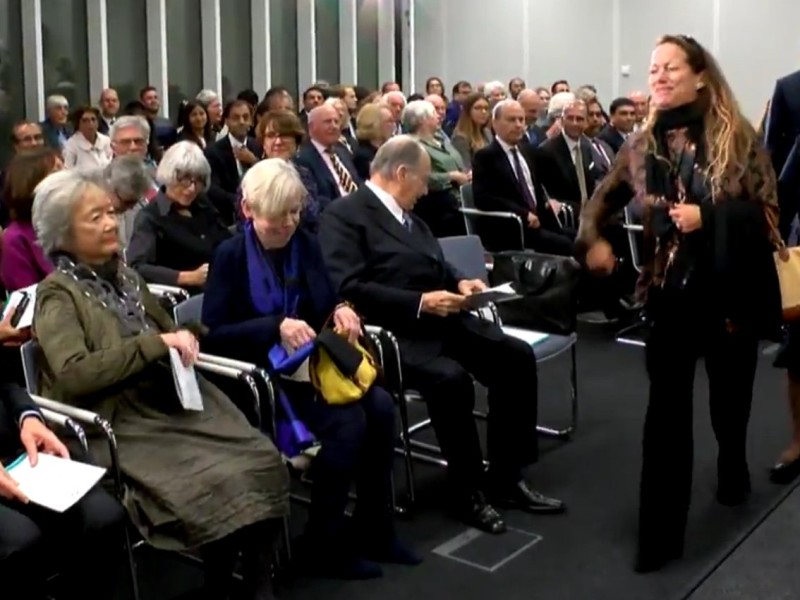
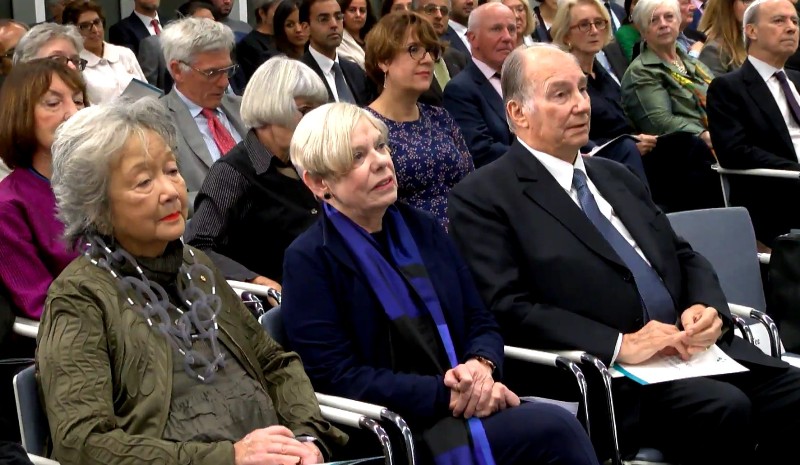
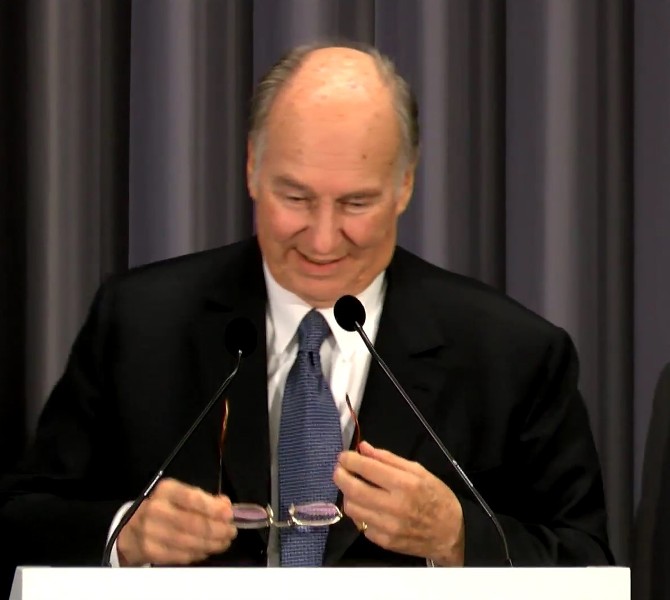
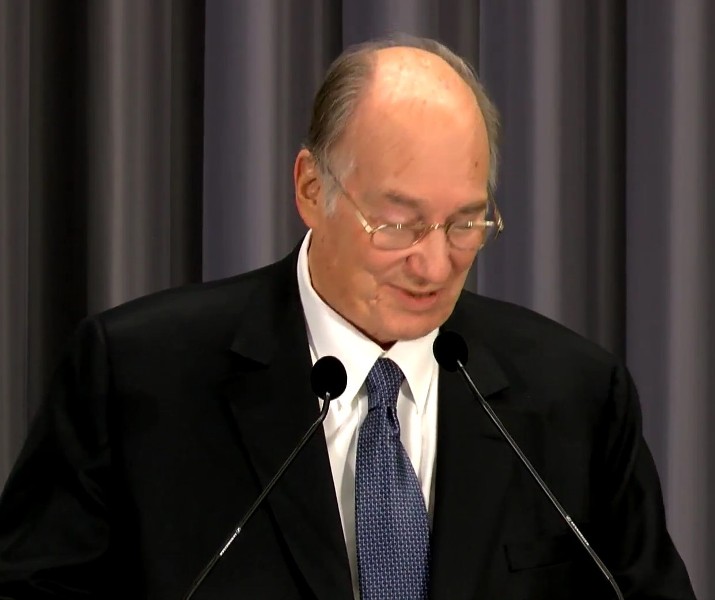
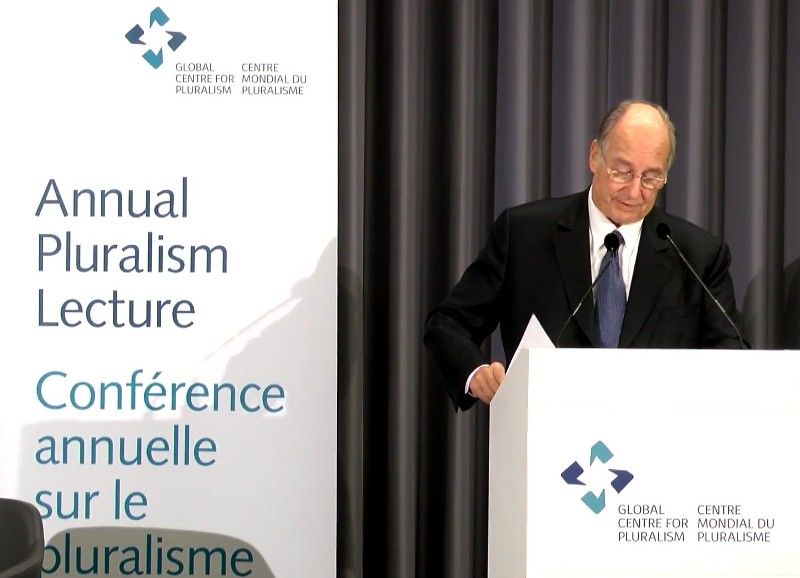
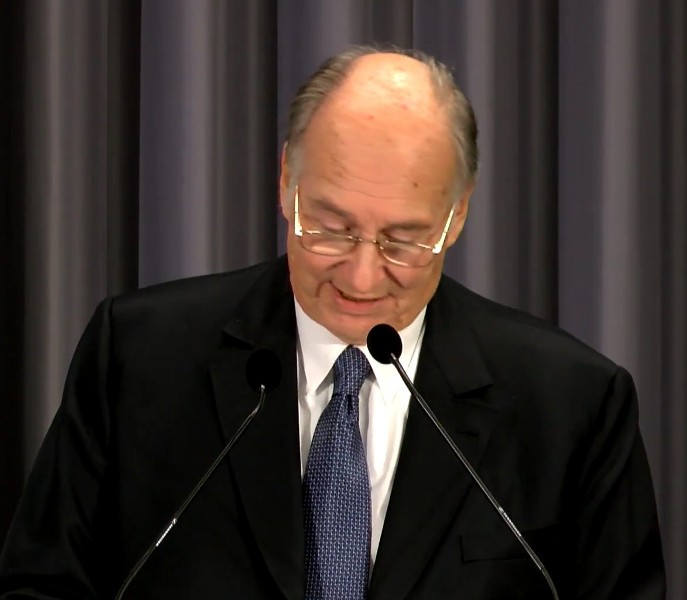
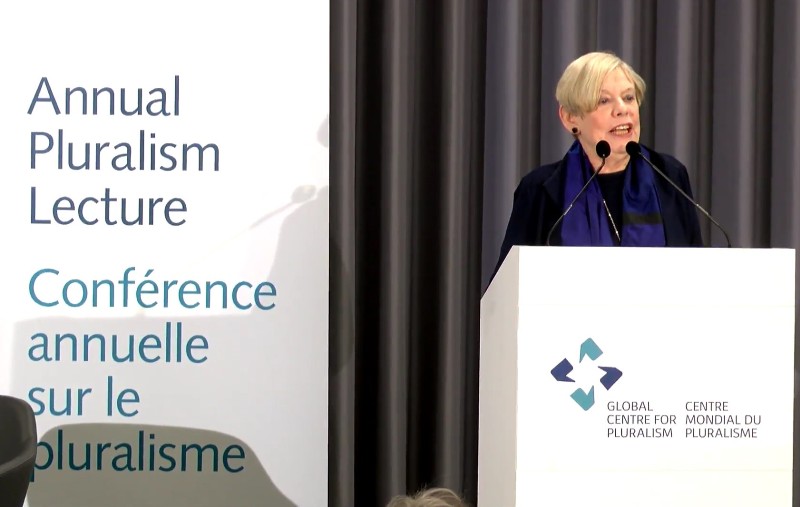
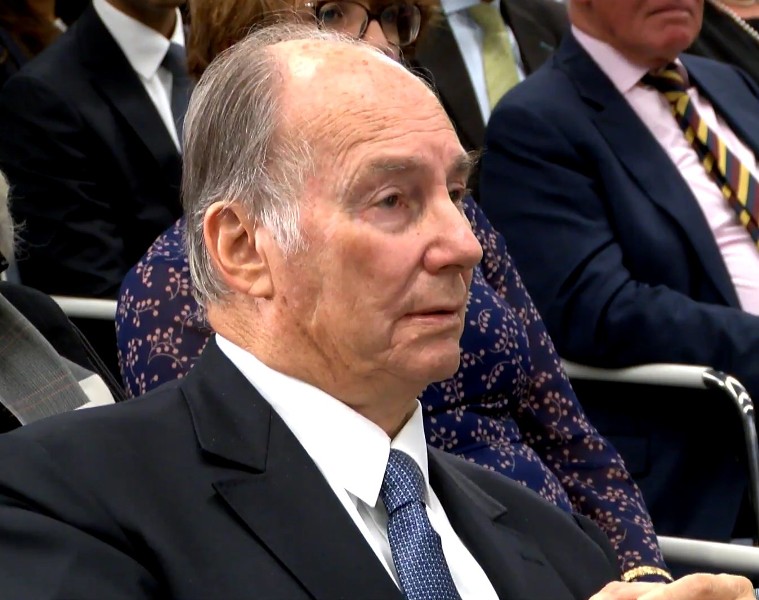
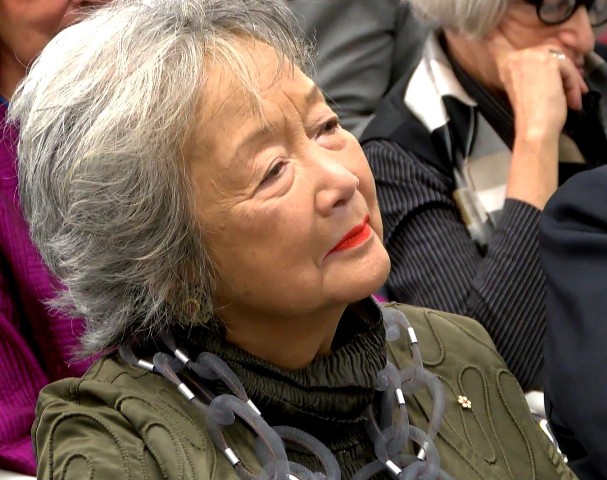
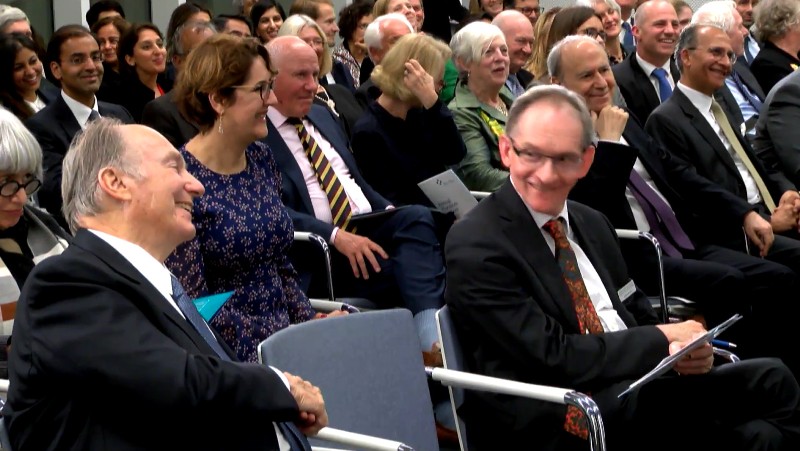
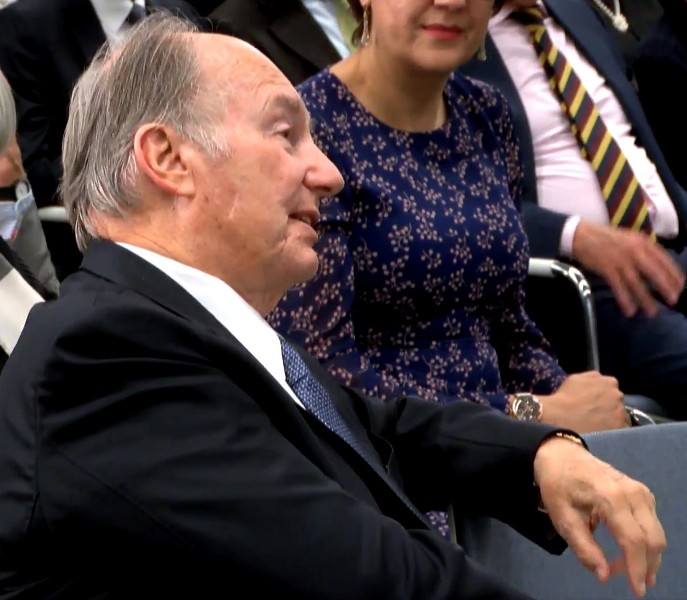
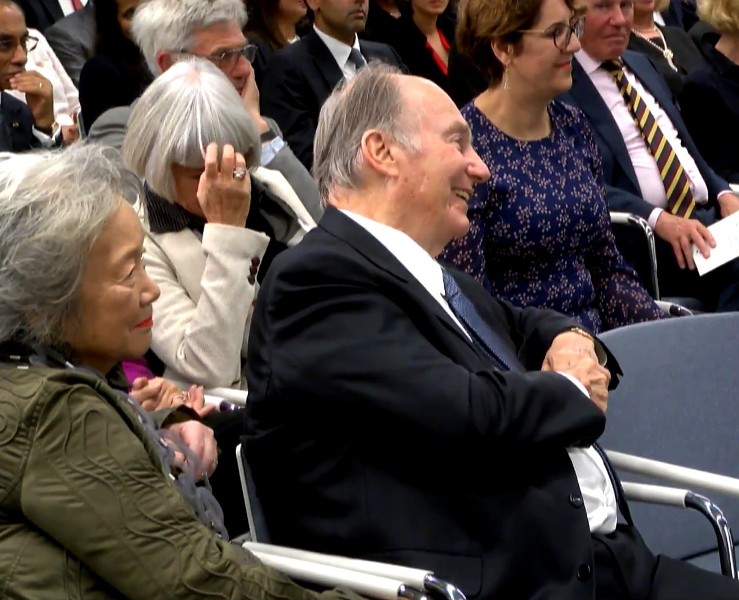
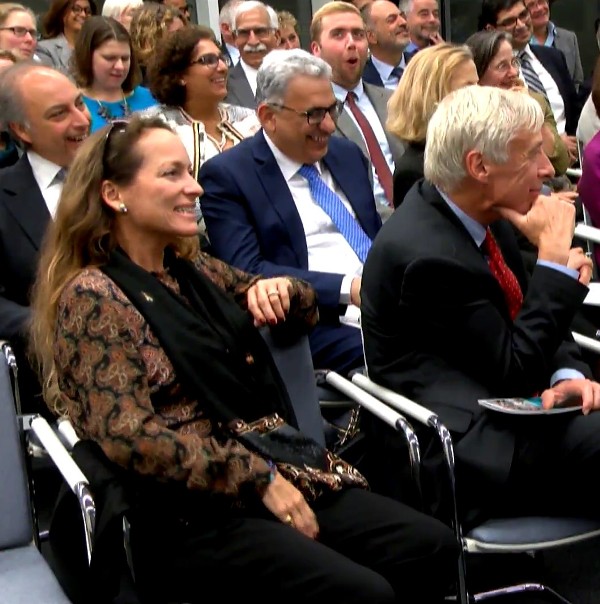
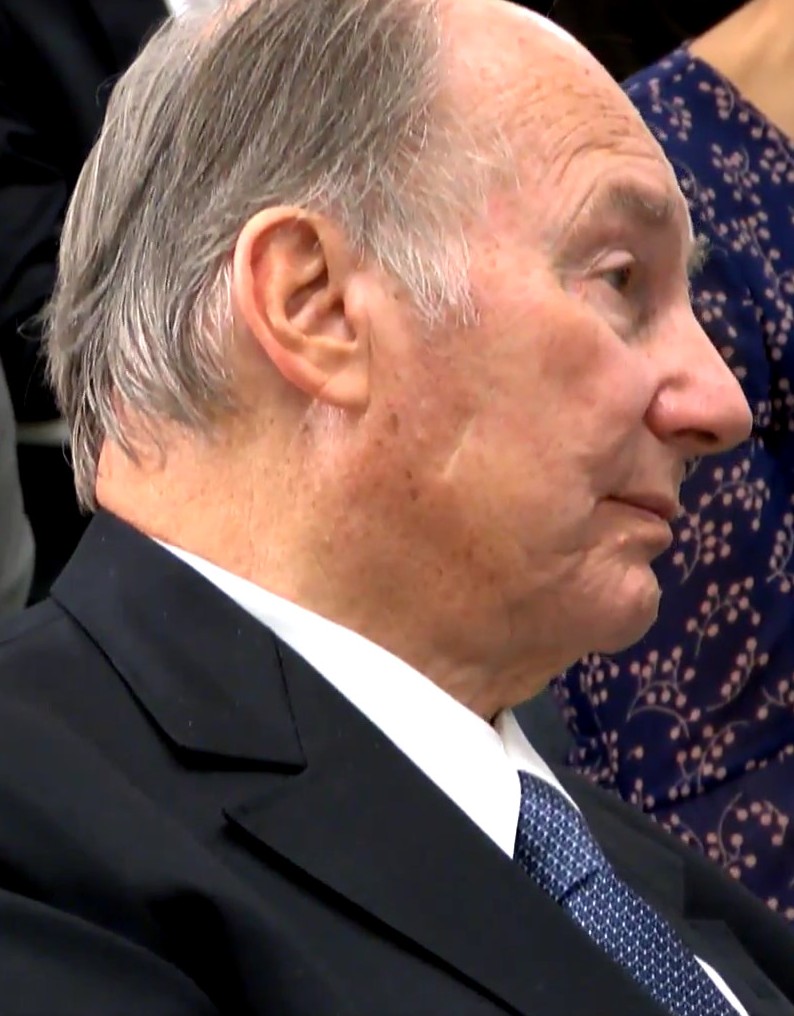
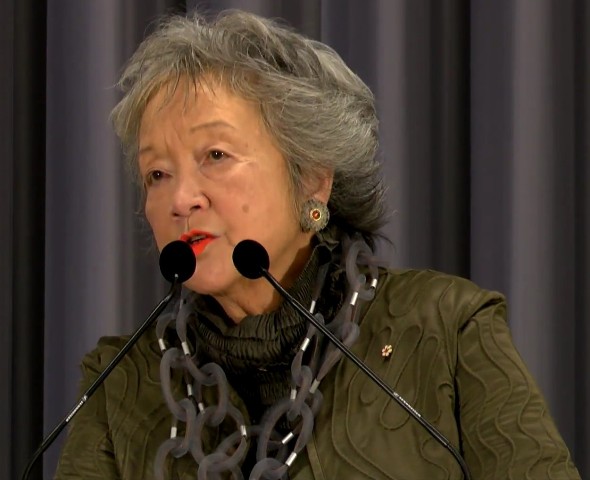
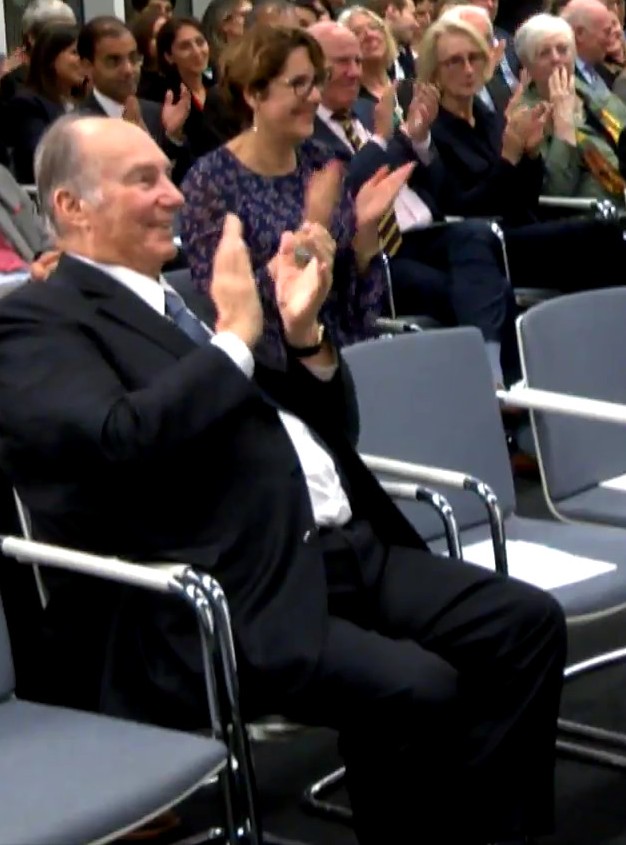
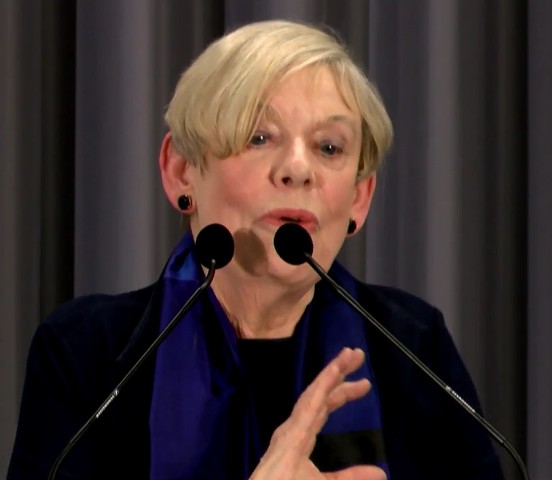
Here are some moments from the event:

















2018, October 4: At the Annual Pluralism Lecture help in London at the Aga Khan Centre, Mowlana Hazar Imam emotionally recognised the contribution of late Kofi Annan before introducing Karen Amstrong, the lecturer of 2018.
Mr Kofi Annan was one of the directors of the GCP.
Here is the video of the Imam talking of Kofi Annan.
http://ismaili.net/timeline/2018/2018-1 ... m-kofi.mp4
Mr Kofi Annan was one of the directors of the GCP.
Here is the video of the Imam talking of Kofi Annan.
http://ismaili.net/timeline/2018/2018-1 ... m-kofi.mp4
Karen Armstrong delivers Annual Pluralism Lecture at Aga Khan Centre
Karen Armstrong delivered the Global Centre for Pluralism’s 2018 Annual Pluralism Lecture at the Aga Khan Centre on 4 October, in the presence of Mawlana Hazar Imam, Princess Zahra, former Governor General of Canada Adrienne Clarkson, and Secretary General of the Global Centre for Pluralism John McNee.
Armstrong — a British author, historian, officer of the Order of the British Empire, and fellow of the Royal Society of Literature — spoke about “the urgent global imperative that is pluralism.”
Mawlana Hazar Imam introduced Armstrong as, “a person who has contributed in a remarkable way to illuminating Islam, Judaism, and Christianity, and indeed understanding all of the great religious traditions.”
He went on to say, “Looking into the future, I think one of the greatest challenges for the entire world will be finding ways in which we can all achieve a deeper understanding of the other, and what makes each of us distinct as human beings and as communities. To achieve this vital goal, reflective, creative, and empathetic thinkers and writers will be critically important. Tonight, we are privileged to hear from one of their most respected voices.”
Armstrong began her lecture by asking why the world needs pluralism. She went on to say that religious pluralism requires people to acknowledge how little they know about the subject of religion, saying it is “unlike other disciplines.” Having the humility to admit what we do not know is a vital step in embarking on a journey of open-hearted discovery, about ourselves and others.
Karen Armstrong proposed that ego causes certain groups to regard that only their beliefs are correct or better than others. As an alternative to the prevalence of ignorance and ego, Armstrong suggested that a more compassionate way of living and interacting is urgently required in today’s fragmented world.
The practice of compassion goes beyond mere toleration, she said. Much more than sympathy or pity, compassion involves seeing the common humanity in another, and encourages care and concern for others, near and far.
Photos and more...
https://the.ismaili/karen-armstrong-del ... e-aga-khan
*******
SPEECH DELIVERED BY His Highness the Aga Khan
Bismillah-ir-Rahman-ir-Rahim
Your Excellencies,
Ministers,
Ms. Armstrong,
Ladies and Gentlemen,
It is my great pleasure to welcome you, on behalf of the Board of the Global Centre for Pluralism, to the 2018 Pluralism Lecture at the new Aga Khan Centre here in London.
At the outset, I should like to remark on the passing of our fellow Director, the late Kofi Annan.
I was privileged to know and work with Mr. Annan for many years. He made an enormous contribution to the Global Centre for Pluralism, just one of his many remarkable contributions to humanity. He will be greatly missed. Our thoughts are with Mrs Annan at this difficult time. It is gratifying that the important work of the Kofi Annan Foundation for a fairer, more peaceful world is continuing.
Ladies and Gentlemen, allow me a moment to speak of this beautiful building and the transformative power of architecture. I hope you will have the opportunity to explore the building and especially to visit its unique series of gardens, courtyards and terrace, each one inspired by a different region of the Islamic world.
The building also stands as a testament to the value of education: it is the new home for two educational institutions - the Aga Khan University’s Institute for the Study of Muslim Civilisations and the Institute of Ismaili Studies.
Through research and learning, they will contribute to increased understanding of the rich history and varied traditions of different Muslim civilisations. In so doing, they should help bridge the gulf of ignorance that has characterized Islamic-Western relations for far too long.
Tonight’s speaker, Karen Armstrong, is a person who has contributed in a remarkable way to illuminating Islam, Judaism and Christianity, and indeed, understanding all of the great religious traditions.
One of the world’s most respected and prolific historians of religion, Ms. Armstrong has written more than 20 books, translated into 45 languages. Notably, in Fields of Blood: Religion and the History of Violence, she challenged the view that religion has been the cause of many of history’s violent conflicts, and argued convincingly that in many cases, religion has been the pretext. An original thinker and activist, her work has resonated well beyond the realm of theologians and philosophers.
A graduate from the University of Oxford with a degree in literature, Ms Armstrong went on to teach, and in 1982 she had become a freelance writer and broadcaster. After being retained to work on a documentary on St Paul, she spent time in the Middle East. She was inspired by the time she spent there. She learnt and she reflected on the great religions, and found her vocation as a writer exploring the commonalities shared by the faiths of Islam, Judaism and Christianity - commonalities such as the Golden Rule - behave towards others how you would like them to behave towards you.
In February 2008, Ms. Armstrong was invited to participate in the TED speaker series where she made the case for the creation of a Charter for Compassion. Her talk had a great impact and led to her winning the coveted TED prize which allowed her to implement the beginnings of the Charter for Compassion.
A year and a half later, the final Charter for Compassion was released. The process of its creation included the contributions of more than 150,000 people from around the world, who submitted their thoughts online. Their ideas were then refined into a final draft by a panel of leading theologians.
This idea of compassion resonates with people. When Amin Hashwani, a business executive and activist in Pakistan, heard Ms. Armstrong’s TED Talk, it affected him deeply. In 2011, Amin Hashwani founded the Compassionate School Network, a programme to train schools and educators to build student skills in compassion, which is still operating with great success.
The momentum and excitement behind this global initiative led to another remarkable book by Ms Armstrong: Twelve Steps to a Compassionate Life.
Ladies and Gentlemen, looking into the future, I think that one of the greatest challenges for the entire world will be finding ways in which we can all achieve a deeper understanding of the other, and what makes each of us distinct, as human beings and as communities.
To achieve this vital goal, reflective, creative and empathetic thinkers and writers will be critically important.
Tonight, we are privileged to hear from one of their most respected voices, Karen Armstrong.
Thank you.
https://www.akdn.org/speech/his-highnes ... sm-lecture
*******
Karen Armstrong delivers the 2018 Global Centre for Pluralism Annual Lecture at the Aga Khan Centre
London, United Kingdom, 4 October 2018 – Karen Armstrong, the British author, delivered the annual 2018 Global Centre for Pluralism Lecture today at the new Aga Khan Centre. The title of Ms. Armstrong’s lecture was “Compassion or Toleration? Two Approaches to Pluralism”. Each person invited to give the Annual Pluralism Lecture is asked to reflect on how to build and strengthen pluralist societies. The Lecture is hosted by the Global Centre for Pluralism, an independent, charitable organisation founded by His Highness the Aga Khan in partnership with the Government of Canada. It is based in Ottawa, Canada.
In her lecture, Ms. Armstrong spoke about the value of religion during what could be the “last gasp” of nationalism: “What the religions all tell us… [is] that enlightenment insists on overcoming the ego, letting the ego go. Nationalism is about ego, it's about swelling the ego, and often that means excluding the other, as Lord Acton pointed out.”
Citing her current work on the scriptures of three of the world’s great religions, she went on to say that “the scriptures - all, in every tradition - say you have to work for the good of others, all others, not just those in your own camp, practically and creatively. That is the route to enlightenment.”
More...
https://www.akdn.org/press-release/kare ... han-centre
Karen Armstrong delivered the Global Centre for Pluralism’s 2018 Annual Pluralism Lecture at the Aga Khan Centre on 4 October, in the presence of Mawlana Hazar Imam, Princess Zahra, former Governor General of Canada Adrienne Clarkson, and Secretary General of the Global Centre for Pluralism John McNee.
Armstrong — a British author, historian, officer of the Order of the British Empire, and fellow of the Royal Society of Literature — spoke about “the urgent global imperative that is pluralism.”
Mawlana Hazar Imam introduced Armstrong as, “a person who has contributed in a remarkable way to illuminating Islam, Judaism, and Christianity, and indeed understanding all of the great religious traditions.”
He went on to say, “Looking into the future, I think one of the greatest challenges for the entire world will be finding ways in which we can all achieve a deeper understanding of the other, and what makes each of us distinct as human beings and as communities. To achieve this vital goal, reflective, creative, and empathetic thinkers and writers will be critically important. Tonight, we are privileged to hear from one of their most respected voices.”
Armstrong began her lecture by asking why the world needs pluralism. She went on to say that religious pluralism requires people to acknowledge how little they know about the subject of religion, saying it is “unlike other disciplines.” Having the humility to admit what we do not know is a vital step in embarking on a journey of open-hearted discovery, about ourselves and others.
Karen Armstrong proposed that ego causes certain groups to regard that only their beliefs are correct or better than others. As an alternative to the prevalence of ignorance and ego, Armstrong suggested that a more compassionate way of living and interacting is urgently required in today’s fragmented world.
The practice of compassion goes beyond mere toleration, she said. Much more than sympathy or pity, compassion involves seeing the common humanity in another, and encourages care and concern for others, near and far.
Photos and more...
https://the.ismaili/karen-armstrong-del ... e-aga-khan
*******
SPEECH DELIVERED BY His Highness the Aga Khan
Bismillah-ir-Rahman-ir-Rahim
Your Excellencies,
Ministers,
Ms. Armstrong,
Ladies and Gentlemen,
It is my great pleasure to welcome you, on behalf of the Board of the Global Centre for Pluralism, to the 2018 Pluralism Lecture at the new Aga Khan Centre here in London.
At the outset, I should like to remark on the passing of our fellow Director, the late Kofi Annan.
I was privileged to know and work with Mr. Annan for many years. He made an enormous contribution to the Global Centre for Pluralism, just one of his many remarkable contributions to humanity. He will be greatly missed. Our thoughts are with Mrs Annan at this difficult time. It is gratifying that the important work of the Kofi Annan Foundation for a fairer, more peaceful world is continuing.
Ladies and Gentlemen, allow me a moment to speak of this beautiful building and the transformative power of architecture. I hope you will have the opportunity to explore the building and especially to visit its unique series of gardens, courtyards and terrace, each one inspired by a different region of the Islamic world.
The building also stands as a testament to the value of education: it is the new home for two educational institutions - the Aga Khan University’s Institute for the Study of Muslim Civilisations and the Institute of Ismaili Studies.
Through research and learning, they will contribute to increased understanding of the rich history and varied traditions of different Muslim civilisations. In so doing, they should help bridge the gulf of ignorance that has characterized Islamic-Western relations for far too long.
Tonight’s speaker, Karen Armstrong, is a person who has contributed in a remarkable way to illuminating Islam, Judaism and Christianity, and indeed, understanding all of the great religious traditions.
One of the world’s most respected and prolific historians of religion, Ms. Armstrong has written more than 20 books, translated into 45 languages. Notably, in Fields of Blood: Religion and the History of Violence, she challenged the view that religion has been the cause of many of history’s violent conflicts, and argued convincingly that in many cases, religion has been the pretext. An original thinker and activist, her work has resonated well beyond the realm of theologians and philosophers.
A graduate from the University of Oxford with a degree in literature, Ms Armstrong went on to teach, and in 1982 she had become a freelance writer and broadcaster. After being retained to work on a documentary on St Paul, she spent time in the Middle East. She was inspired by the time she spent there. She learnt and she reflected on the great religions, and found her vocation as a writer exploring the commonalities shared by the faiths of Islam, Judaism and Christianity - commonalities such as the Golden Rule - behave towards others how you would like them to behave towards you.
In February 2008, Ms. Armstrong was invited to participate in the TED speaker series where she made the case for the creation of a Charter for Compassion. Her talk had a great impact and led to her winning the coveted TED prize which allowed her to implement the beginnings of the Charter for Compassion.
A year and a half later, the final Charter for Compassion was released. The process of its creation included the contributions of more than 150,000 people from around the world, who submitted their thoughts online. Their ideas were then refined into a final draft by a panel of leading theologians.
This idea of compassion resonates with people. When Amin Hashwani, a business executive and activist in Pakistan, heard Ms. Armstrong’s TED Talk, it affected him deeply. In 2011, Amin Hashwani founded the Compassionate School Network, a programme to train schools and educators to build student skills in compassion, which is still operating with great success.
The momentum and excitement behind this global initiative led to another remarkable book by Ms Armstrong: Twelve Steps to a Compassionate Life.
Ladies and Gentlemen, looking into the future, I think that one of the greatest challenges for the entire world will be finding ways in which we can all achieve a deeper understanding of the other, and what makes each of us distinct, as human beings and as communities.
To achieve this vital goal, reflective, creative and empathetic thinkers and writers will be critically important.
Tonight, we are privileged to hear from one of their most respected voices, Karen Armstrong.
Thank you.
https://www.akdn.org/speech/his-highnes ... sm-lecture
*******
Karen Armstrong delivers the 2018 Global Centre for Pluralism Annual Lecture at the Aga Khan Centre
London, United Kingdom, 4 October 2018 – Karen Armstrong, the British author, delivered the annual 2018 Global Centre for Pluralism Lecture today at the new Aga Khan Centre. The title of Ms. Armstrong’s lecture was “Compassion or Toleration? Two Approaches to Pluralism”. Each person invited to give the Annual Pluralism Lecture is asked to reflect on how to build and strengthen pluralist societies. The Lecture is hosted by the Global Centre for Pluralism, an independent, charitable organisation founded by His Highness the Aga Khan in partnership with the Government of Canada. It is based in Ottawa, Canada.
In her lecture, Ms. Armstrong spoke about the value of religion during what could be the “last gasp” of nationalism: “What the religions all tell us… [is] that enlightenment insists on overcoming the ego, letting the ego go. Nationalism is about ego, it's about swelling the ego, and often that means excluding the other, as Lord Acton pointed out.”
Citing her current work on the scriptures of three of the world’s great religions, she went on to say that “the scriptures - all, in every tradition - say you have to work for the good of others, all others, not just those in your own camp, practically and creatively. That is the route to enlightenment.”
More...
https://www.akdn.org/press-release/kare ... han-centre
Award Jury
The Global Pluralism Award jury is comprised of international experts from various disciplines related to pluralism. Jurors have championed the values upon which the Award is founded: respect for human diversity and promotion of more inclusive societies.
Read the press release about the 2019 Global Pluralism Award jury here.
https://award.pluralism.ca/wp-content/u ... _PR_EN.pdf
More...
https://award.pluralism.ca/the-award/award-jury/
The Global Pluralism Award jury is comprised of international experts from various disciplines related to pluralism. Jurors have championed the values upon which the Award is founded: respect for human diversity and promotion of more inclusive societies.
Read the press release about the 2019 Global Pluralism Award jury here.
https://award.pluralism.ca/wp-content/u ... _PR_EN.pdf
More...
https://award.pluralism.ca/the-award/award-jury/
ElevateU - Defining Pluralism
What is the difference between Diversity, Tolerance and Pluralism? How can you contribute towards the vision of a more pluralistic society?
Video:
https://www.youtube.com/watch?time_cont ... 8AtAtWiQBU
What is the difference between Diversity, Tolerance and Pluralism? How can you contribute towards the vision of a more pluralistic society?
Video:
https://www.youtube.com/watch?time_cont ... 8AtAtWiQBU
https://www.akdn.org/video/gcp-annual-p ... cture-2018
London, United Kingom, 4 October 2018 - If you missed the live webcast, here is the full video of the GCP Annual Pluralism Lecture 2018 delivered by Karen Armstrong including the question and answer session moderated by the BBC’s Lyse Doucet.
London, United Kingom, 4 October 2018 - If you missed the live webcast, here is the full video of the GCP Annual Pluralism Lecture 2018 delivered by Karen Armstrong including the question and answer session moderated by the BBC’s Lyse Doucet.
Highlights from the Global Centre for Pluralism's Annual Pluralism Lecture 2018
Video:
https://the.ismaili/highlights-global-p ... cture-2018
Video:
https://the.ismaili/highlights-global-p ... cture-2018
Videos of all the lectures
Annual Lectures from the Global Centre for Pluralism
https://www.youtube.com/channel/UCr7cUT ... VvKy-r1xqg
Annual Lectures from the Global Centre for Pluralism
https://www.youtube.com/channel/UCr7cUT ... VvKy-r1xqg
Annual Pluralism Lecture, recent events, forthcoming publications and opportunities—The latest from the Centre
https://mailchi.mp/pluralism/newsletter ... 20f57ec9da
https://mailchi.mp/pluralism/newsletter ... 20f57ec9da
https://www.nation.co.ke/news/Pluralism ... index.html
Daily Nation
Pluralism key to peace, progress, says Aga Khan
Wednesday October 17 2018
In Summary
Aga Khan academies work to create an integrated global community that encompasses economic, ethnic, religious and geographic diversity.
Students draw valuable life lessons not only from learning together but also from living together — especially if the mix is diverse.
-----------------------
By CORRESPONDENT
The Aga Khan has noted the importance of pluralism in tackling increasing fragmentation and confrontation in the world. In an interview with IB Magazine, the global leader of the Shia Ismaili Muslims, and respected philanthropist, praised pluralism as the “indispensable foundation for human peace and progress”.
“The human society is essentially pluralist, and awareness of the diverse contributions of people, across times and cultures, to global civilisation is essential in engendering respect and understanding,” he said.
GLOBAL COMMUNITY
He was speaking about the decision for Aga Khan academies to take the International Baccalaureate (IB) model, which he praised for its innovative approach to learning and promotion of multi-cultural experiences.
“Mutual understanding and respect do not come naturally, they must be taught and experienced. The academies work to create an integrated global community that encompasses economic, ethnic, religious and geographic diversity. We believe students draw valuable life lessons not only from learning together but also from living together — especially if the mix is diverse,” he said.
PROFESSIONAL DEVELOPMENT
He said, however, that it is hard to find teachers trained to embrace the IB model, especially in countries where the form of learning is rote rather than enquiry-based. “We need to reframe the role of the teacher, develop students’ ownership of their learning and support teachers in using multidisciplinary methods," he said.
"This requires emphasis of appropriate recruitment and robust professional development. The academies provide education for teachers through professional development centres."
Daily Nation
Pluralism key to peace, progress, says Aga Khan
Wednesday October 17 2018
In Summary
Aga Khan academies work to create an integrated global community that encompasses economic, ethnic, religious and geographic diversity.
Students draw valuable life lessons not only from learning together but also from living together — especially if the mix is diverse.
-----------------------
By CORRESPONDENT
The Aga Khan has noted the importance of pluralism in tackling increasing fragmentation and confrontation in the world. In an interview with IB Magazine, the global leader of the Shia Ismaili Muslims, and respected philanthropist, praised pluralism as the “indispensable foundation for human peace and progress”.
“The human society is essentially pluralist, and awareness of the diverse contributions of people, across times and cultures, to global civilisation is essential in engendering respect and understanding,” he said.
GLOBAL COMMUNITY
He was speaking about the decision for Aga Khan academies to take the International Baccalaureate (IB) model, which he praised for its innovative approach to learning and promotion of multi-cultural experiences.
“Mutual understanding and respect do not come naturally, they must be taught and experienced. The academies work to create an integrated global community that encompasses economic, ethnic, religious and geographic diversity. We believe students draw valuable life lessons not only from learning together but also from living together — especially if the mix is diverse,” he said.
PROFESSIONAL DEVELOPMENT
He said, however, that it is hard to find teachers trained to embrace the IB model, especially in countries where the form of learning is rote rather than enquiry-based. “We need to reframe the role of the teacher, develop students’ ownership of their learning and support teachers in using multidisciplinary methods," he said.
"This requires emphasis of appropriate recruitment and robust professional development. The academies provide education for teachers through professional development centres."
2018 GCP Annual Lecture - Full video
London, United Kingdom, 4 October 2018 - If you missed the live webcast, here is the full video of the GCP Annual Pluralism Lecture 2018 delivered by Karen Armstrong including the question and answer session moderated by the BBC’s Lyse Doucet.
https://www.youtube.com/watch?v=ui-2onT0yLU
London, United Kingdom, 4 October 2018 - If you missed the live webcast, here is the full video of the GCP Annual Pluralism Lecture 2018 delivered by Karen Armstrong including the question and answer session moderated by the BBC’s Lyse Doucet.
https://www.youtube.com/watch?v=ui-2onT0yLU
The Centre announces the newest member of its Board of Directors, the Right Honourable Beverley McLachlin, former Chief Justice of Canada and #pluralismchampion. Ms. McLachlin delivered the 2015 #PluralismLecture. We are honored to welcome her. https://www.pluralism.ca/event/annual-lecture-4/ …
https://twitter.com/GlobalPluralism/sta ... 6292119552
https://twitter.com/GlobalPluralism/sta ... 6292119552
Donate
Diversity is a fact. Pluralism is a choice.
The experience of living with diversity is not new, but as the world grows more interconnected, the challenges of building inclusive societies have intensified. The rise of populism and xenophobia in many parts of the world – targeted at immigrants, refugees, ethnic and religious minorities and others deemed “foreign” – stems, in part, from a fear of diversity and a lack of respect for human differences.
Pluralism offers a different path. By responding positively to human differences, that is, by choosing pluralism, more positive social outcomes are possible.
We need to change the global response to diversity.
Each day, individuals, governments and other organizations champion pluralism around the world. And each day, the Global Centre for Pluralism seeks to support these champions and to inform their work. From the Global Pluralism Award that recognizes and supports exceptional people and projects, to analysis, education and dialogue, we work to build awareness and understanding of the choices and actions that advance pluralism.
Pluralism offers a pathway to living peacefully and productively in diverse societies. But building a more inclusive world is challenging and cannot be accomplished without your help.
Donate today and help us build a more inclusive world.
*The Global Centre for Pluralism issues charitable tax receipts for all donations over $20 CND
More...
https://www.pluralism.ca/donate/
Diversity is a fact. Pluralism is a choice.
The experience of living with diversity is not new, but as the world grows more interconnected, the challenges of building inclusive societies have intensified. The rise of populism and xenophobia in many parts of the world – targeted at immigrants, refugees, ethnic and religious minorities and others deemed “foreign” – stems, in part, from a fear of diversity and a lack of respect for human differences.
Pluralism offers a different path. By responding positively to human differences, that is, by choosing pluralism, more positive social outcomes are possible.
We need to change the global response to diversity.
Each day, individuals, governments and other organizations champion pluralism around the world. And each day, the Global Centre for Pluralism seeks to support these champions and to inform their work. From the Global Pluralism Award that recognizes and supports exceptional people and projects, to analysis, education and dialogue, we work to build awareness and understanding of the choices and actions that advance pluralism.
Pluralism offers a pathway to living peacefully and productively in diverse societies. But building a more inclusive world is challenging and cannot be accomplished without your help.
Donate today and help us build a more inclusive world.
*The Global Centre for Pluralism issues charitable tax receipts for all donations over $20 CND
More...
https://www.pluralism.ca/donate/
Board Member announcement, Pluralism Award one year recap, new publications and a job posting — the latest from the Global Centre for Pluralism
Recent News:
The Right Honourable Beverley McLachlin appointed to Board of Directors
The Centre is pleased to announce the appointment of The Right Honourable Beverley McLachlin PC, CC, CStJ, FCIArb to the Board of Directors. Ms. McLachlin served as Chief Justice of Canada from 2000 to 2017. Ms. McLachlin delivered the Annual Pluralism Lecture in 2015. Speaking on tolerance in the modern era, she said: “To live harmoniously in a diverse, pluralistic society demands great generosity of spirit and openness of mind, a willingness to accept difference and indeed to celebrate it.”
Find out more about the Centre’s Board of Directors here.
https://www.pluralism.ca/who-we-are/board-of-directors/
One-year anniversary of the 2017 Pluralism Awards
Alice Nderitu, Leyner Palacios Asprilla and Daniel Webb, the three winners of the 2017 Global Pluralism Award, continue to build on the momentum generated by the award to champion pluralism in their communities. Find out what the winners and honourable mentions have achieved this past year with the support of the Centre.
https://award.pluralism.ca/the-award/en ... ecipients/
Recent Publications
This fall the Centre published four new papers in the publications series Intersections: Practicing Pluralism and Accounting for Change in Diverse Societies. These papers contribute to the Centre’s growing body of work on the drivers of pluralism and how a pluralistic view of diversity can contribute to established fields of practice.
1. “Human Rights, Minority Rights, Non-Discrimination and Pluralism: A Mapping Study of Intersections for Practitioners” by Corinne Lennox
2. “Constitutions: Frameworks for Pluralism?” by Christina Murray
3. “Democracy Promotion and Pluralism—Mapping Study” by Gerd Schönwälder
4. “Democracy and the Accommodation of Diversity: Advancing Pluralism Through Shared Rule, Self-Rule and Limited Rule” by Rotimi Suberu
Annual Pluralism Lecture full text now available
The Global Centre for Pluralism hosted the Annual Pluralism Lecture on October 4th, 2018 at the Aga Khan Centre in London, UK. Karen Armstrong, author and religious historian, delivered an inspiring lecture titled “Compassion or Toleration? Two Approaches to Pluralism.”
The full text of Ms. Armstrong’s lecture is now available on our website.
The video of her lecture can be seen here.
Opportunities:
Job Posting: Manager, Partnerships and Development (Ottawa, Canada)
The Centre is hiring a Manager, Partnerships and Development to support the expansion of its global programming and impact. The successful candidate will bring significant resource development experience. They will be entrepreneurial and strategic with demonstrable fundraising success in an international organization or policy research context.
Candidates must be eligible to work in Canada. The Centre is committed to equity in its mandate and its staff. Please note that only shortlisted candidates will be contacted
Closing date: applications accepted on a rolling basis
Full Description
Call for Public Affairs Volunteers
Are you passionate about promoting inclusion? Are you a strong communicator?
We are looking for public affairs volunteers of all ages to help us share the Centre's history and mission with the public during events and seasonal visiting hours. Prospective volunteers must be based in Ottawa, Canada.
Find out more here.
https://www.pluralism.ca/opportunity/
Recent News:
The Right Honourable Beverley McLachlin appointed to Board of Directors
The Centre is pleased to announce the appointment of The Right Honourable Beverley McLachlin PC, CC, CStJ, FCIArb to the Board of Directors. Ms. McLachlin served as Chief Justice of Canada from 2000 to 2017. Ms. McLachlin delivered the Annual Pluralism Lecture in 2015. Speaking on tolerance in the modern era, she said: “To live harmoniously in a diverse, pluralistic society demands great generosity of spirit and openness of mind, a willingness to accept difference and indeed to celebrate it.”
Find out more about the Centre’s Board of Directors here.
https://www.pluralism.ca/who-we-are/board-of-directors/
One-year anniversary of the 2017 Pluralism Awards
Alice Nderitu, Leyner Palacios Asprilla and Daniel Webb, the three winners of the 2017 Global Pluralism Award, continue to build on the momentum generated by the award to champion pluralism in their communities. Find out what the winners and honourable mentions have achieved this past year with the support of the Centre.
https://award.pluralism.ca/the-award/en ... ecipients/
Recent Publications
This fall the Centre published four new papers in the publications series Intersections: Practicing Pluralism and Accounting for Change in Diverse Societies. These papers contribute to the Centre’s growing body of work on the drivers of pluralism and how a pluralistic view of diversity can contribute to established fields of practice.
1. “Human Rights, Minority Rights, Non-Discrimination and Pluralism: A Mapping Study of Intersections for Practitioners” by Corinne Lennox
2. “Constitutions: Frameworks for Pluralism?” by Christina Murray
3. “Democracy Promotion and Pluralism—Mapping Study” by Gerd Schönwälder
4. “Democracy and the Accommodation of Diversity: Advancing Pluralism Through Shared Rule, Self-Rule and Limited Rule” by Rotimi Suberu
Annual Pluralism Lecture full text now available
The Global Centre for Pluralism hosted the Annual Pluralism Lecture on October 4th, 2018 at the Aga Khan Centre in London, UK. Karen Armstrong, author and religious historian, delivered an inspiring lecture titled “Compassion or Toleration? Two Approaches to Pluralism.”
The full text of Ms. Armstrong’s lecture is now available on our website.
The video of her lecture can be seen here.
Opportunities:
Job Posting: Manager, Partnerships and Development (Ottawa, Canada)
The Centre is hiring a Manager, Partnerships and Development to support the expansion of its global programming and impact. The successful candidate will bring significant resource development experience. They will be entrepreneurial and strategic with demonstrable fundraising success in an international organization or policy research context.
Candidates must be eligible to work in Canada. The Centre is committed to equity in its mandate and its staff. Please note that only shortlisted candidates will be contacted
Closing date: applications accepted on a rolling basis
Full Description
Call for Public Affairs Volunteers
Are you passionate about promoting inclusion? Are you a strong communicator?
We are looking for public affairs volunteers of all ages to help us share the Centre's history and mission with the public during events and seasonal visiting hours. Prospective volunteers must be based in Ottawa, Canada.
Find out more here.
https://www.pluralism.ca/opportunity/
Diversity within a common humanity
While the forces of globalisation may have brought humanity’s inherent differences into sharper focus, the roots of this diversity lie in an ancient and divine imperative.
In our globalised world, people of different national, cultural, religious, and linguistic backgrounds interact with each other more and more every day. In such a world, the need for a generous outlook that allows us to live in mutual respect and harmony becomes more important than ever before. After all, the Holy Qur’an states that all of mankind has been created from a single soul.
The movement of people across the world occurs at a frequency and volume unmatched in human history. Advancements in transportation, the spread of the global workforce, increasing urbanisation, and the search for economic opportunity are just a few factors that fuel the flow of people across borders.
These forces have been compounded by the existence of human conflict, economic and political strife, and climate change, which have also resulted in the frequent and often forced movement of people from one place to another. Naturally, this has created more encounters with difference.
Such interactions bring with them the exciting prospect of diversity as a wellspring of knowledge, beauty, innovation, and creativity. However, there is also a danger that such encounters may lead to hostility, due to ignorance and fear of the unknown.
In these situations, one reaction may be the retreat into comforting spheres of familiarity, where the “other” is excluded, and complex cultural histories are reduced to cruel and crude caricatures.
Finding ourselves in this situation, it may help to remember that notions of difference and diversity are not new. According to Islamic belief, the world’s diversity is in fact a generous blessing. While the forces of globalisation may have brought humanity’s inherent differences into sharper focus, the roots of this diversity lie in an ancient and divine imperative.
Sura al-Hujarat, selected by Mawlana Hazar Imam to feature in the Diamond Jubilee emblem, proclaims:
“O mankind, indeed, We have created you from male and female and made you peoples and tribes that you may know one another. Indeed, the most noble of you in the sight of Allah is the most righteous of you.” (49:13)
For humanity to live peacefully, and thrive in an environment of difference and diversity, the cultivation of a cosmopolitan ethic is required. At the LaFontaine Baldwin Lecture in Toronto in 2010 Mawlana Hazar Imam remarked:
“In sum, what we must seek and share is what I have called ‘a cosmopolitan ethic,’ a readiness to accept the complexity of human society. It is an ethic which balances rights and duties. It is an ethic for all people. In that light, the amazing diversity of Creation itself can be seen as a great gift to us – not a cause for anxiety but a source for delight… In this spirit of humility and hospitality the stranger will be welcomed and respected, rather than subdued and ignored.”
The notion of a cosmopolitan ethic has a long and complex history. The word “cosmopolitan” is rooted in the Greek word kosmopolitês meaning ‘citizen of the world.’ Its first explicit use has been attributed to the Greek philosopher Diogenes who, when asked where he was from, is said to have replied, “I am a citizen of the world ‘kosmopolitês.’”
Since then, the world has evolved and so too have understandings and definitions of cosmopolitanism. Yet throughout time, core to this idea is the understanding that humanity in all its diversity is bound in a single community. This does not mean ignoring our differences, but rather, celebrating them.
How might one arrive at a cosmopolitan ethic? Such an outlook can be rooted in a common set of principles that, while not exclusive to a distinct group or denomination, speak to the heart of humanity’s shared interests and values. These may include a shared concern for improving the quality of life, for the respect and dignity of each man and woman, and a shared responsibility to help those in need.
These common concerns have guided, and continue to guide the work of the Ismaili Imamat and the Aga Khan Development Network. While the outcome of AKDN's work is practical, the motivation is spiritual, drawing on the universal principle to invoke the goodness that exists in each person.
In this regard, a commitment to improving the quality of life is fundamental to a cosmopolitan ethic. It touches upon a shared responsibility to ourselves and to the other. This duty is one that extends beyond the differences of race, religion, culture, language, and ethnicity in search of a shared and common humanity.
Delivering the Jodidi Lecture at Harvard in 2015, Mawlana Hazar Imam remarked, “a cosmopolitan ethic is one that will honour both our common humanity and our distinctive identities — each reinforcing the other as part of the same high moral calling.”
Hazar Imam continued, “The central lesson of my own personal journey — over many miles and many years — is the indispensability of such an ethic in our changing world, based on the timeless truth that we are — each of us and all of us — ‘born of a single soul.’”
https://the.ismaili/our-stories/diversi ... rce=Direct
While the forces of globalisation may have brought humanity’s inherent differences into sharper focus, the roots of this diversity lie in an ancient and divine imperative.
In our globalised world, people of different national, cultural, religious, and linguistic backgrounds interact with each other more and more every day. In such a world, the need for a generous outlook that allows us to live in mutual respect and harmony becomes more important than ever before. After all, the Holy Qur’an states that all of mankind has been created from a single soul.
The movement of people across the world occurs at a frequency and volume unmatched in human history. Advancements in transportation, the spread of the global workforce, increasing urbanisation, and the search for economic opportunity are just a few factors that fuel the flow of people across borders.
These forces have been compounded by the existence of human conflict, economic and political strife, and climate change, which have also resulted in the frequent and often forced movement of people from one place to another. Naturally, this has created more encounters with difference.
Such interactions bring with them the exciting prospect of diversity as a wellspring of knowledge, beauty, innovation, and creativity. However, there is also a danger that such encounters may lead to hostility, due to ignorance and fear of the unknown.
In these situations, one reaction may be the retreat into comforting spheres of familiarity, where the “other” is excluded, and complex cultural histories are reduced to cruel and crude caricatures.
Finding ourselves in this situation, it may help to remember that notions of difference and diversity are not new. According to Islamic belief, the world’s diversity is in fact a generous blessing. While the forces of globalisation may have brought humanity’s inherent differences into sharper focus, the roots of this diversity lie in an ancient and divine imperative.
Sura al-Hujarat, selected by Mawlana Hazar Imam to feature in the Diamond Jubilee emblem, proclaims:
“O mankind, indeed, We have created you from male and female and made you peoples and tribes that you may know one another. Indeed, the most noble of you in the sight of Allah is the most righteous of you.” (49:13)
For humanity to live peacefully, and thrive in an environment of difference and diversity, the cultivation of a cosmopolitan ethic is required. At the LaFontaine Baldwin Lecture in Toronto in 2010 Mawlana Hazar Imam remarked:
“In sum, what we must seek and share is what I have called ‘a cosmopolitan ethic,’ a readiness to accept the complexity of human society. It is an ethic which balances rights and duties. It is an ethic for all people. In that light, the amazing diversity of Creation itself can be seen as a great gift to us – not a cause for anxiety but a source for delight… In this spirit of humility and hospitality the stranger will be welcomed and respected, rather than subdued and ignored.”
The notion of a cosmopolitan ethic has a long and complex history. The word “cosmopolitan” is rooted in the Greek word kosmopolitês meaning ‘citizen of the world.’ Its first explicit use has been attributed to the Greek philosopher Diogenes who, when asked where he was from, is said to have replied, “I am a citizen of the world ‘kosmopolitês.’”
Since then, the world has evolved and so too have understandings and definitions of cosmopolitanism. Yet throughout time, core to this idea is the understanding that humanity in all its diversity is bound in a single community. This does not mean ignoring our differences, but rather, celebrating them.
How might one arrive at a cosmopolitan ethic? Such an outlook can be rooted in a common set of principles that, while not exclusive to a distinct group or denomination, speak to the heart of humanity’s shared interests and values. These may include a shared concern for improving the quality of life, for the respect and dignity of each man and woman, and a shared responsibility to help those in need.
These common concerns have guided, and continue to guide the work of the Ismaili Imamat and the Aga Khan Development Network. While the outcome of AKDN's work is practical, the motivation is spiritual, drawing on the universal principle to invoke the goodness that exists in each person.
In this regard, a commitment to improving the quality of life is fundamental to a cosmopolitan ethic. It touches upon a shared responsibility to ourselves and to the other. This duty is one that extends beyond the differences of race, religion, culture, language, and ethnicity in search of a shared and common humanity.
Delivering the Jodidi Lecture at Harvard in 2015, Mawlana Hazar Imam remarked, “a cosmopolitan ethic is one that will honour both our common humanity and our distinctive identities — each reinforcing the other as part of the same high moral calling.”
Hazar Imam continued, “The central lesson of my own personal journey — over many miles and many years — is the indispensability of such an ethic in our changing world, based on the timeless truth that we are — each of us and all of us — ‘born of a single soul.’”
https://the.ismaili/our-stories/diversi ... rce=Direct
Ugandan Jamat embraces diversity and pluralism
The Jamat in Uganda consists of a blend of East and West, with Ismailis having settled in Uganda from various parts of the world including Belgium, Canada, India, Pakistan, and the United Kingdom. The various Jamati institutions in Uganda have drawn strength from this diversity and the knowledge and experience it brings, and have organised a number of initiatives to embrace diversity and pluralism within the Jamat and beyond.
Through its Early Childhood Development (ECD) centres, the Aga Khan Education Board of Uganda works closely with teachers, students, and parents to teach young children the values of being a diverse community. One of the approaches adopted includes Cultural Day, where students and teachers displayed flags, artifacts, currencies, and attire from different countries and participants dressed in traditional clothing representing the different cultures and traditions. They greeted the audience in different languages, shared some facts about each country, sang cultural songs, and served cultural dishes like posho and juggu sauce, dokhla, and pancakes.
The Outreach Portfolio organised an annual Milad Un Nabi celebration with Muslim community leaders. This year’s celebration included a discussion on the acquisition of knowledge and diversity as part of Islamic faith. The key objective behind the annual event is to forge a way towards a better, more peaceful, and tolerant world.
The Aga Khan Development Network (AKDN) in Uganda recently hosted a lecture to celebrate the example of the Buganda Kingdom within the remarkable multicultural society of Uganda. Buganda is the largest of the traditional kingdoms in present-day Uganda. Its people, the Baganda, make up Uganda’s largest ethnic group. The lecture was conducted by the former Katikiro (Prime Minister) of Buganda, Mr Joseph Mulwanyamuli Ssemogerere.
Mr Ssemogerere acknowledged both Mawlana Hazar Imam and the Kabaka of Buganda, Ronald Muwenda Mutebi II for championing cultural diversity and pluralism in Uganda through the different undertakings of their institutions.
According to Mr Ssemogerere, since the arrival of Allidina Visram as the first Ismaili to settle in Buganda, the Ismailis have been part of Buganda culture, including becoming ministers and members of the Lukiiko (Kingdom parliament).
The Diplomatic Representative of the Aga Khan Development Network in Uganda, Amin Mawji said, “These lectures are aimed at creating a space for conversation where the leaders in Uganda sit in one room to reflect on current issues, explore new ideas and fresh perspectives, and to promote new solutions to the problems that face the society.”
Mr Mawji noted that a recent study conducted by Harvard University found that Uganda is the most ethnically diverse country on the planet.
“The study made me pause to reflect on what examples of good practice we might find here — in the most ethnically diverse country in the world — of inclusion, rather than exclusion, as a way to respond to the challenges of our world,” Mr Mawji said. “Pluralism is about actively seeking a deeper understanding across lines of difference, an understanding of different traditions, different cultures, and different ways of looking at societal issues.”
https://the.ismaili/our-stories/ugandan ... rce=Direct
The Jamat in Uganda consists of a blend of East and West, with Ismailis having settled in Uganda from various parts of the world including Belgium, Canada, India, Pakistan, and the United Kingdom. The various Jamati institutions in Uganda have drawn strength from this diversity and the knowledge and experience it brings, and have organised a number of initiatives to embrace diversity and pluralism within the Jamat and beyond.
Through its Early Childhood Development (ECD) centres, the Aga Khan Education Board of Uganda works closely with teachers, students, and parents to teach young children the values of being a diverse community. One of the approaches adopted includes Cultural Day, where students and teachers displayed flags, artifacts, currencies, and attire from different countries and participants dressed in traditional clothing representing the different cultures and traditions. They greeted the audience in different languages, shared some facts about each country, sang cultural songs, and served cultural dishes like posho and juggu sauce, dokhla, and pancakes.
The Outreach Portfolio organised an annual Milad Un Nabi celebration with Muslim community leaders. This year’s celebration included a discussion on the acquisition of knowledge and diversity as part of Islamic faith. The key objective behind the annual event is to forge a way towards a better, more peaceful, and tolerant world.
The Aga Khan Development Network (AKDN) in Uganda recently hosted a lecture to celebrate the example of the Buganda Kingdom within the remarkable multicultural society of Uganda. Buganda is the largest of the traditional kingdoms in present-day Uganda. Its people, the Baganda, make up Uganda’s largest ethnic group. The lecture was conducted by the former Katikiro (Prime Minister) of Buganda, Mr Joseph Mulwanyamuli Ssemogerere.
Mr Ssemogerere acknowledged both Mawlana Hazar Imam and the Kabaka of Buganda, Ronald Muwenda Mutebi II for championing cultural diversity and pluralism in Uganda through the different undertakings of their institutions.
According to Mr Ssemogerere, since the arrival of Allidina Visram as the first Ismaili to settle in Buganda, the Ismailis have been part of Buganda culture, including becoming ministers and members of the Lukiiko (Kingdom parliament).
The Diplomatic Representative of the Aga Khan Development Network in Uganda, Amin Mawji said, “These lectures are aimed at creating a space for conversation where the leaders in Uganda sit in one room to reflect on current issues, explore new ideas and fresh perspectives, and to promote new solutions to the problems that face the society.”
Mr Mawji noted that a recent study conducted by Harvard University found that Uganda is the most ethnically diverse country on the planet.
“The study made me pause to reflect on what examples of good practice we might find here — in the most ethnically diverse country in the world — of inclusion, rather than exclusion, as a way to respond to the challenges of our world,” Mr Mawji said. “Pluralism is about actively seeking a deeper understanding across lines of difference, an understanding of different traditions, different cultures, and different ways of looking at societal issues.”
https://the.ismaili/our-stories/ugandan ... rce=Direct
A cosmopolitan ethic in action
The Ismaili Council for Bangladesh hosted an event earlier this year in which the notion of a cosmopolitan ethic was explored and discussed by a selection of esteemed speakers and guests, gathered within the beautiful setting of the Ismaili Jamatkhana and Centre in Dhaka.
Mr Sulaiman Ajanee, President of the Ismaili Council for Bangladesh, welcomed guests from academia, civil society, and the private sector, along with members of the Jamat to the Centre, and spoke of the values which underpin the Aga Khan Development Network (AKDN). One of these is the ethic of inclusiveness, which draws upon Islam’s vision of a society which is inclusive, and embraces human difference.
Sir Fazle Hasan Abed was invited to deliver the keynote address on this occasion, and to share his experiences as one of the leading figures of civil society in the country. He is the Founder and Chairman of the non-governmental organisation BRAC (Building Resources Across Communities).
Sir Abed remarked that cosmopolitanism is an “acceptance and appreciation of the fact that we human beings will choose to express ourselves in different ways.” Sir Abed further shared how a cosmopolitan ethic has been reflected in the work of BRAC, which began operations in Bangladesh, before expanding further afield, to other parts of Asia, Sub-Saharan Africa, and Central America.
Dr Rubana Huq, also shared her thoughts with guests gathered at the event. Dr Huq currently serves as Managing Director of the Mohammadi Group, a garments manufacturer which has diversified into fields as wide-ranging as real estate, energy, and media. Speaking of the dynamic potential of human agency, she said that a “cosmopolitan ethic means that we neither expect nor desire that every person or society should converge on a single mode of life, that is not possible. But we have a moral and ethical choice to positively change whatever we can within our own means.”
In his remarks, Mr Munir M. Merali, AKDN Resident Diplomatic Representative to Bangladesh, presented the organisation’s ethical framework and how it is positioned as a contemporary endeavor of the Ismaili Imamat to realise the social conscience of Islam through institutional action. Representative Merali further explained that the Network brings together, under one coherent aegis, institutions and programmes whose combined mandate is to help relieve society of ignorance, disease and deprivation without regard to the faiths or national origins of people whom they serve.
Referring to speeches made by Mawlana Hazar Imam on the subject, Representative Merali expressed that a “cosmopolitan ethic also means to bring hope where there is despair and poverty, to embrace diversity, and to promote pluralism while employing meritocracy in all that we do.”
Imamat Institutions have been present in Bangladesh since 1960s when the Ismaili Imamat directed investments towards what became a thriving jute mill industry. Today, AKDN works in the areas of early childhood development, pre-tertiary education, and financial services, aiming to improve living conditions and opportunities for people regardless of religion, race, ethnicity or gender.
Following the signing of the Protocol of Cooperation with the Government in 2013, AKDN today is considered one of the partners of choice with further investments directed to to help improve and build-on the education sector in the country. With this mind, and in line with this objective, AKDN is in the process of establishing the Aga Khan Academy Dhaka, a state-of-the-art, residential school where students are selected based on merit, regardless of socio-economic, cultural, or religious background, facilitating a diverse and fertile environment in which students can flourish. A key strand of the Academy’s curriculum is pluralism; encouraging students in their formative years to respect and embrace human difference.
One of the key objectives of the Academies programme is to develop home-grown, ethical leaders of the future who may one day contribute to the economic and social development of the country.
https://the.ismaili/news/cosmopolitan-ethic-action
The Ismaili Council for Bangladesh hosted an event earlier this year in which the notion of a cosmopolitan ethic was explored and discussed by a selection of esteemed speakers and guests, gathered within the beautiful setting of the Ismaili Jamatkhana and Centre in Dhaka.
Mr Sulaiman Ajanee, President of the Ismaili Council for Bangladesh, welcomed guests from academia, civil society, and the private sector, along with members of the Jamat to the Centre, and spoke of the values which underpin the Aga Khan Development Network (AKDN). One of these is the ethic of inclusiveness, which draws upon Islam’s vision of a society which is inclusive, and embraces human difference.
Sir Fazle Hasan Abed was invited to deliver the keynote address on this occasion, and to share his experiences as one of the leading figures of civil society in the country. He is the Founder and Chairman of the non-governmental organisation BRAC (Building Resources Across Communities).
Sir Abed remarked that cosmopolitanism is an “acceptance and appreciation of the fact that we human beings will choose to express ourselves in different ways.” Sir Abed further shared how a cosmopolitan ethic has been reflected in the work of BRAC, which began operations in Bangladesh, before expanding further afield, to other parts of Asia, Sub-Saharan Africa, and Central America.
Dr Rubana Huq, also shared her thoughts with guests gathered at the event. Dr Huq currently serves as Managing Director of the Mohammadi Group, a garments manufacturer which has diversified into fields as wide-ranging as real estate, energy, and media. Speaking of the dynamic potential of human agency, she said that a “cosmopolitan ethic means that we neither expect nor desire that every person or society should converge on a single mode of life, that is not possible. But we have a moral and ethical choice to positively change whatever we can within our own means.”
In his remarks, Mr Munir M. Merali, AKDN Resident Diplomatic Representative to Bangladesh, presented the organisation’s ethical framework and how it is positioned as a contemporary endeavor of the Ismaili Imamat to realise the social conscience of Islam through institutional action. Representative Merali further explained that the Network brings together, under one coherent aegis, institutions and programmes whose combined mandate is to help relieve society of ignorance, disease and deprivation without regard to the faiths or national origins of people whom they serve.
Referring to speeches made by Mawlana Hazar Imam on the subject, Representative Merali expressed that a “cosmopolitan ethic also means to bring hope where there is despair and poverty, to embrace diversity, and to promote pluralism while employing meritocracy in all that we do.”
Imamat Institutions have been present in Bangladesh since 1960s when the Ismaili Imamat directed investments towards what became a thriving jute mill industry. Today, AKDN works in the areas of early childhood development, pre-tertiary education, and financial services, aiming to improve living conditions and opportunities for people regardless of religion, race, ethnicity or gender.
Following the signing of the Protocol of Cooperation with the Government in 2013, AKDN today is considered one of the partners of choice with further investments directed to to help improve and build-on the education sector in the country. With this mind, and in line with this objective, AKDN is in the process of establishing the Aga Khan Academy Dhaka, a state-of-the-art, residential school where students are selected based on merit, regardless of socio-economic, cultural, or religious background, facilitating a diverse and fertile environment in which students can flourish. A key strand of the Academy’s curriculum is pluralism; encouraging students in their formative years to respect and embrace human difference.
One of the key objectives of the Academies programme is to develop home-grown, ethical leaders of the future who may one day contribute to the economic and social development of the country.
https://the.ismaili/news/cosmopolitan-ethic-action
Publications
ACCOUNTING FOR CHANGE IN DIVERSE SOCIETIES
Accounting for Change in Diverse Societies is a new publication series from the Global Centre for Pluralism focussed on six world regions. Each “change case” examines a specific moment when a county altered its approach to diversity, either expanding or eroding the foundations of inclusive citizenship. The series also features thematic overviews by leading global scholars. The series aims to build global understanding of the sources of inclusion and exclusion in diverse societies and the pathways to pluralism. This work was carried out with the aid of a grant from the International Development Research Centre, based in Ottawa, Canada. Read the papers at the links below.
https://www.pluralism.ca/accounting-cha ... societies/
ACCOUNTING FOR CHANGE IN DIVERSE SOCIETIES
Accounting for Change in Diverse Societies is a new publication series from the Global Centre for Pluralism focussed on six world regions. Each “change case” examines a specific moment when a county altered its approach to diversity, either expanding or eroding the foundations of inclusive citizenship. The series also features thematic overviews by leading global scholars. The series aims to build global understanding of the sources of inclusion and exclusion in diverse societies and the pathways to pluralism. This work was carried out with the aid of a grant from the International Development Research Centre, based in Ottawa, Canada. Read the papers at the links below.
https://www.pluralism.ca/accounting-cha ... societies/
Annual Reports & Corporate Plans
https://www.pluralism.ca/who-we-are/ann ... ate-plans/
Corporate Plan 2019
The Centre enters 2019 with a maturing program and a strong sense of forward motion. Highlights include finalizing the Centre’s foundational paper, Pluralism Lens on Diversity, hosting the second Global Pluralism Award ceremony and a range of events to bring the pluralism theme to global audiences.
DOWNLOAD
https://www.pluralism.ca/wp-content/upl ... SINGLE.pdf
https://www.pluralism.ca/who-we-are/ann ... ate-plans/
Corporate Plan 2019
The Centre enters 2019 with a maturing program and a strong sense of forward motion. Highlights include finalizing the Centre’s foundational paper, Pluralism Lens on Diversity, hosting the second Global Pluralism Award ceremony and a range of events to bring the pluralism theme to global audiences.
DOWNLOAD
https://www.pluralism.ca/wp-content/upl ... SINGLE.pdf
https://mail.google.com/mail/u/0?ui=2&i ... 4468&ser=1
Centre celebrates 40 new Canadians
Canadian Citizenship Ceremony held at the Global Centre for Pluralism
On March 27th 2019, the Centre is pleased to partner with the Institute for Canadian Citizenship (ICC) to host an official citizenship ceremony celebrating 40 new Canadians.
https://www.pluralism.ca/event/centre-c ... canadians/
*****
UN Deputy Secretary-General to address pluralism and the SDGs
Amina J. Mohammed to deliver 2019 Annual Pluralism Lecture
The Centre is pleased to announce that Amina J. Mohammed, Deputy Secretary-General of the United Nations, will deliver the 2019 Annual Pluralism Lecture, addressing the theme of pluralism and the Sustainable Development Goals.
https://www.pluralism.ca/event/un-deput ... -the-sdgs/
******
2019 Global Pluralism Award Jury begins selection process
The Global Pluralism Award Jury, joined remotely by jury member Ory Okolloh, begin discussions. Credit: Patrick Doyle
Members of the international Award jury met recently in Ottawa to review a shortlist of 42 applications from pluralism projects around the world. Jury members are renowned in fields including human rights, education, technology, public policy and corporate social responsibility. Through their work, they have a deep understanding of the effort it takes to build societies where differences are valued and respected. Find out more about the selection process.
https://award.pluralism.ca/the-award/selection-process/
*******
Centre to partner with Metropolis 2019
The Global Centre for Pluralism is a proud partner of the 2019 International Metropolis Conference "The Promise of Migration." Hosted this year in Ottawa and Gatineau, Canada, from June 24-28th, the Conference is the largest annual international gathering of the world experts from academia, governments and civil society in the fields of migration, integration and diversity. To learn more about the Centre’s participation and to register, keep an eye on the official conference website.
https://www.internationalmetropolis2019 ... index.html
*****
Intersections: Practicing Pluralism
How does the concept of social cohesion intersect with that of pluralism? Social cohesion is a concept that policymakers in some contexts have used as a framework to foster well-being in diverse and post-conflict societies. Some interpretations of the concept portray diversity as a threat to social cohesion and seek to identify the mechanisms that might minimize this threat, such as increased trust among groups, fairer distribution of resources, or practices of collaboration. This understanding of social cohesion complements and reinforces the goals of pluralism. By identifying the institutions that foster recognition and drive greater inclusion in diverse societies, a pluralism lens on social cohesion suggests both ways to enhance social cohesion and to counter the fear of some practitioners that diversity is detrimental to social well-being.
DOWNLOAD PAPER
https://www.pluralism.ca/wp-content/upl ... -FINAL.pdf
*******
Global Pluralism Index
MEASURING PLURALISM IN DIVERSE SOCIETIES: GLOBAL PLURALISM INDEX
Living with diversity is a shared global challenge, faced by developed and developing countries alike. Vulnerable groups, such as religious and ethnic minorities, are often subjected to various forms of political, economic, and cultural exclusion in their everyday lives. In order to create peaceful, pluralistic societies, these exclusionary practices must be systematically addressed. To do this, practitioners and policymakers must be able to monitor trends in exclusion and inclusion around the world. However, while there are tools that monitor specific aspects of diversity such as religious freedom or indigenous rights, there are currently no tools that evaluate a society’s treatment of all types of diversity and assess practices across the economic, political, and cultural spheres.
The Global Pluralism Index aims to fill this gap and enable policymakers and practitioners to assess the state of pluralism around the world. In doing so, the Index will also add value to ongoing efforts in the field of upstream conflict prevention, identifying sources of division and exclusion long before conflict erupts, and when interventions may serve to change a negative trajectory.
DOWNLOAD THE INFORMATION SHEET
https://www.pluralism.ca/global-pluralism-index/
Centre celebrates 40 new Canadians
Canadian Citizenship Ceremony held at the Global Centre for Pluralism
On March 27th 2019, the Centre is pleased to partner with the Institute for Canadian Citizenship (ICC) to host an official citizenship ceremony celebrating 40 new Canadians.
https://www.pluralism.ca/event/centre-c ... canadians/
*****
UN Deputy Secretary-General to address pluralism and the SDGs
Amina J. Mohammed to deliver 2019 Annual Pluralism Lecture
The Centre is pleased to announce that Amina J. Mohammed, Deputy Secretary-General of the United Nations, will deliver the 2019 Annual Pluralism Lecture, addressing the theme of pluralism and the Sustainable Development Goals.
https://www.pluralism.ca/event/un-deput ... -the-sdgs/
******
2019 Global Pluralism Award Jury begins selection process
The Global Pluralism Award Jury, joined remotely by jury member Ory Okolloh, begin discussions. Credit: Patrick Doyle
Members of the international Award jury met recently in Ottawa to review a shortlist of 42 applications from pluralism projects around the world. Jury members are renowned in fields including human rights, education, technology, public policy and corporate social responsibility. Through their work, they have a deep understanding of the effort it takes to build societies where differences are valued and respected. Find out more about the selection process.
https://award.pluralism.ca/the-award/selection-process/
*******
Centre to partner with Metropolis 2019
The Global Centre for Pluralism is a proud partner of the 2019 International Metropolis Conference "The Promise of Migration." Hosted this year in Ottawa and Gatineau, Canada, from June 24-28th, the Conference is the largest annual international gathering of the world experts from academia, governments and civil society in the fields of migration, integration and diversity. To learn more about the Centre’s participation and to register, keep an eye on the official conference website.
https://www.internationalmetropolis2019 ... index.html
*****
Intersections: Practicing Pluralism
How does the concept of social cohesion intersect with that of pluralism? Social cohesion is a concept that policymakers in some contexts have used as a framework to foster well-being in diverse and post-conflict societies. Some interpretations of the concept portray diversity as a threat to social cohesion and seek to identify the mechanisms that might minimize this threat, such as increased trust among groups, fairer distribution of resources, or practices of collaboration. This understanding of social cohesion complements and reinforces the goals of pluralism. By identifying the institutions that foster recognition and drive greater inclusion in diverse societies, a pluralism lens on social cohesion suggests both ways to enhance social cohesion and to counter the fear of some practitioners that diversity is detrimental to social well-being.
DOWNLOAD PAPER
https://www.pluralism.ca/wp-content/upl ... -FINAL.pdf
*******
Global Pluralism Index
MEASURING PLURALISM IN DIVERSE SOCIETIES: GLOBAL PLURALISM INDEX
Living with diversity is a shared global challenge, faced by developed and developing countries alike. Vulnerable groups, such as religious and ethnic minorities, are often subjected to various forms of political, economic, and cultural exclusion in their everyday lives. In order to create peaceful, pluralistic societies, these exclusionary practices must be systematically addressed. To do this, practitioners and policymakers must be able to monitor trends in exclusion and inclusion around the world. However, while there are tools that monitor specific aspects of diversity such as religious freedom or indigenous rights, there are currently no tools that evaluate a society’s treatment of all types of diversity and assess practices across the economic, political, and cultural spheres.
The Global Pluralism Index aims to fill this gap and enable policymakers and practitioners to assess the state of pluralism around the world. In doing so, the Index will also add value to ongoing efforts in the field of upstream conflict prevention, identifying sources of division and exclusion long before conflict erupts, and when interventions may serve to change a negative trajectory.
DOWNLOAD THE INFORMATION SHEET
https://www.pluralism.ca/global-pluralism-index/